Attached files
| file | filename |
|---|---|
| 8-K - 8-K - Arcosa, Inc. | aca-20200511.htm |
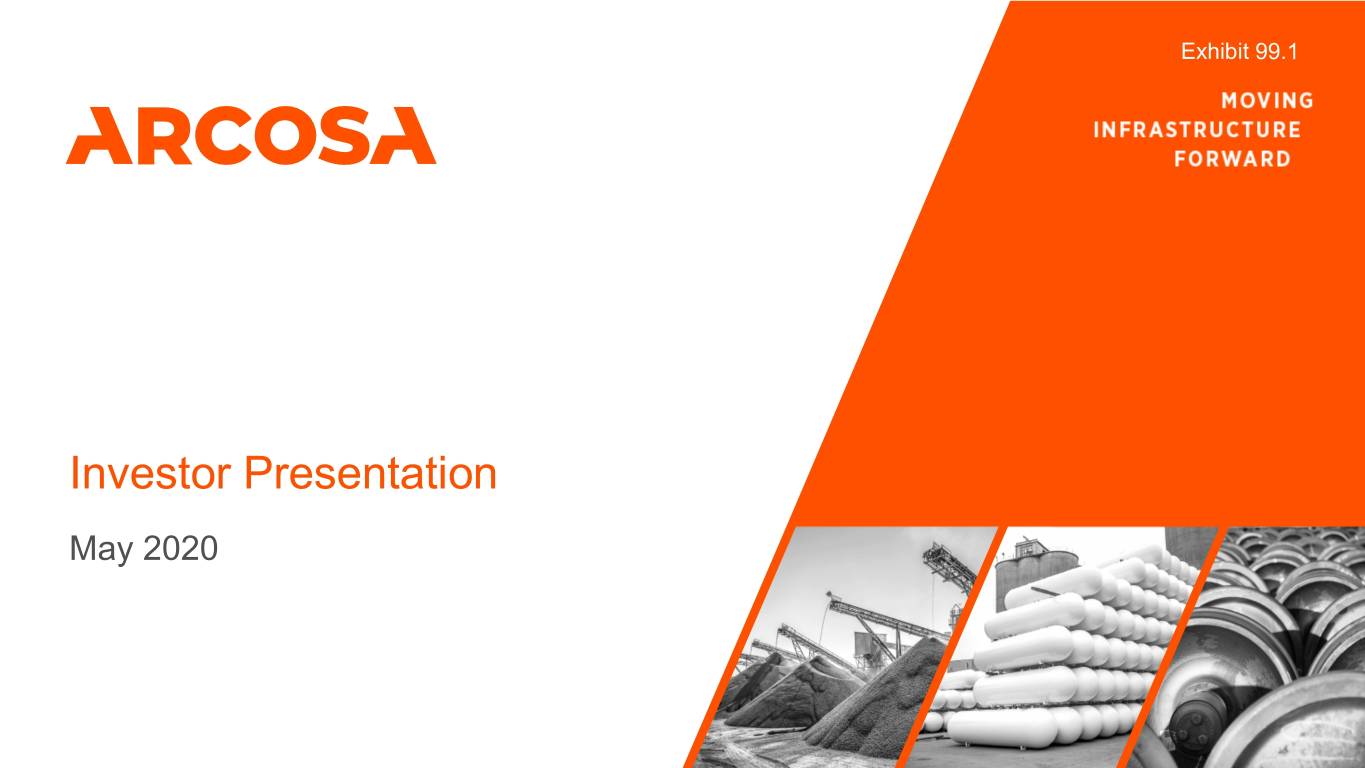
Exhibit 99.1 Investor Presentation May 2020
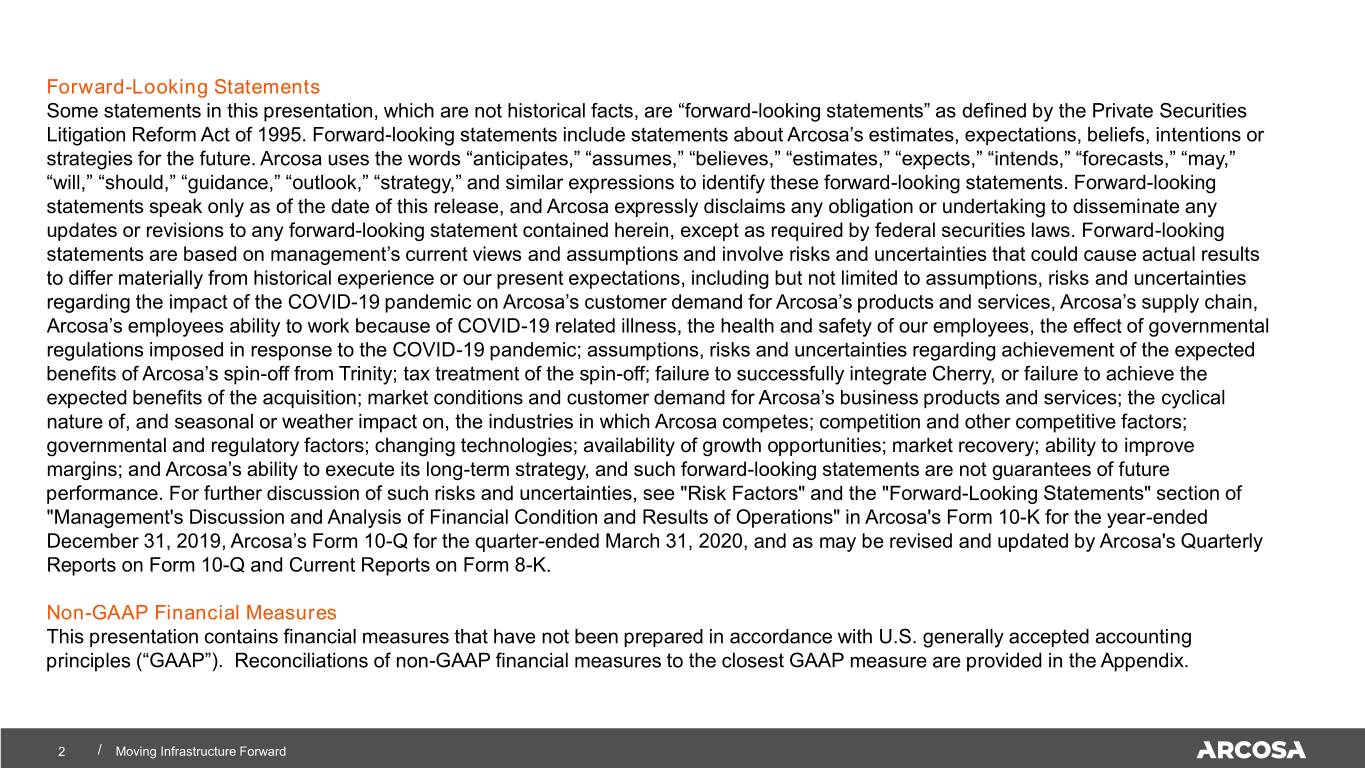
Forward-Looking Statements Some statements in this presentation, which are not historical facts, are “forward-looking statements” as defined by the Private Securities Litigation Reform Act of 1995. Forward-looking statements include statements about Arcosa’s estimates, expectations, beliefs, intentions or strategies for the future. Arcosa uses the words “anticipates,” “assumes,” “believes,” “estimates,” “expects,” “intends,” “forecasts,” “may,” “will,” “should,” “guidance,” “outlook,” “strategy,” and similar expressions to identify these forward-looking statements. Forward-looking statements speak only as of the date of this release, and Arcosa expressly disclaims any obligation or undertaking to disseminate any updates or revisions to any forward-looking statement contained herein, except as required by federal securities laws. Forward-looking statements are based on management’s current views and assumptions and involve risks and uncertainties that could cause actual results to differ materially from historical experience or our present expectations, including but not limited to assumptions, risks and uncertainties regarding the impact of the COVID-19 pandemic on Arcosa’s customer demand for Arcosa’s products and services, Arcosa’s supply chain, Arcosa’s employees ability to work because of COVID-19 related illness, the health and safety of our employees, the effect of governmental regulations imposed in response to the COVID-19 pandemic; assumptions, risks and uncertainties regarding achievement of the expected benefits of Arcosa’s spin-off from Trinity; tax treatment of the spin-off; failure to successfully integrate Cherry, or failure to achieve the expected benefits of the acquisition; market conditions and customer demand for Arcosa’s business products and services; the cyclical nature of, and seasonal or weather impact on, the industries in which Arcosa competes; competition and other competitive factors; governmental and regulatory factors; changing technologies; availability of growth opportunities; market recovery; ability to improve margins; and Arcosa’s ability to execute its long-term strategy, and such forward-looking statements are not guarantees of future performance. For further discussion of such risks and uncertainties, see "Risk Factors" and the "Forward-Looking Statements" section of "Management's Discussion and Analysis of Financial Condition and Results of Operations" in Arcosa's Form 10-K for the year-ended December 31, 2019, Arcosa’s Form 10-Q for the quarter-ended March 31, 2020, and as may be revised and updated by Arcosa's Quarterly Reports on Form 10-Q and Current Reports on Form 8-K. Non-GAAP Financial Measures This presentation contains financial measures that have not been prepared in accordance with U.S. generally accepted accounting principles (“GAAP”). Reconciliations of non-GAAP financial measures to the closest GAAP measure are provided in the Appendix. 2 / Moving Infrastructure Forward
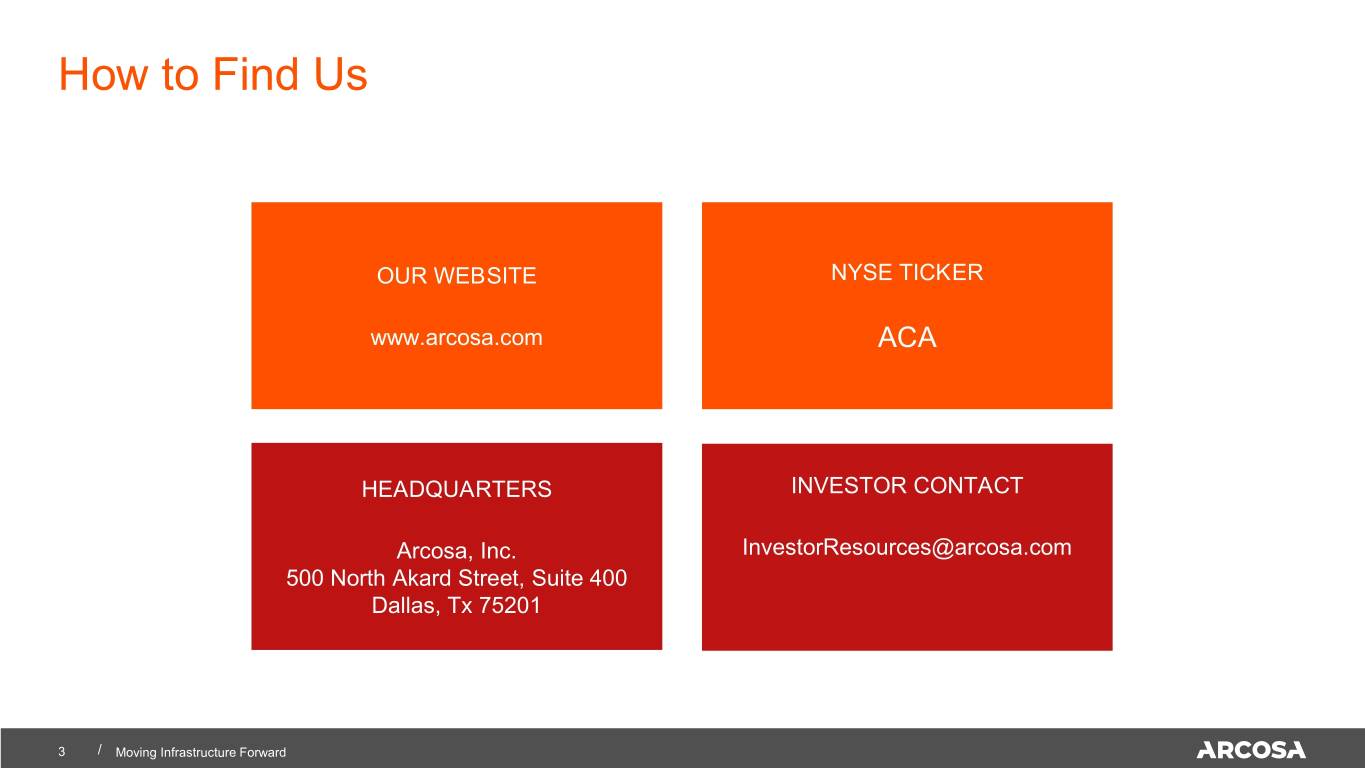
How to Find Us OUR WEBSITE NYSE TICKER www.arcosa.com ACA HEADQUARTERS INVESTOR CONTACT Arcosa, Inc. InvestorResources@arcosa.com 500 North Akard Street, Suite 400 Dallas, Tx 75201 3 / Moving Infrastructure Forward
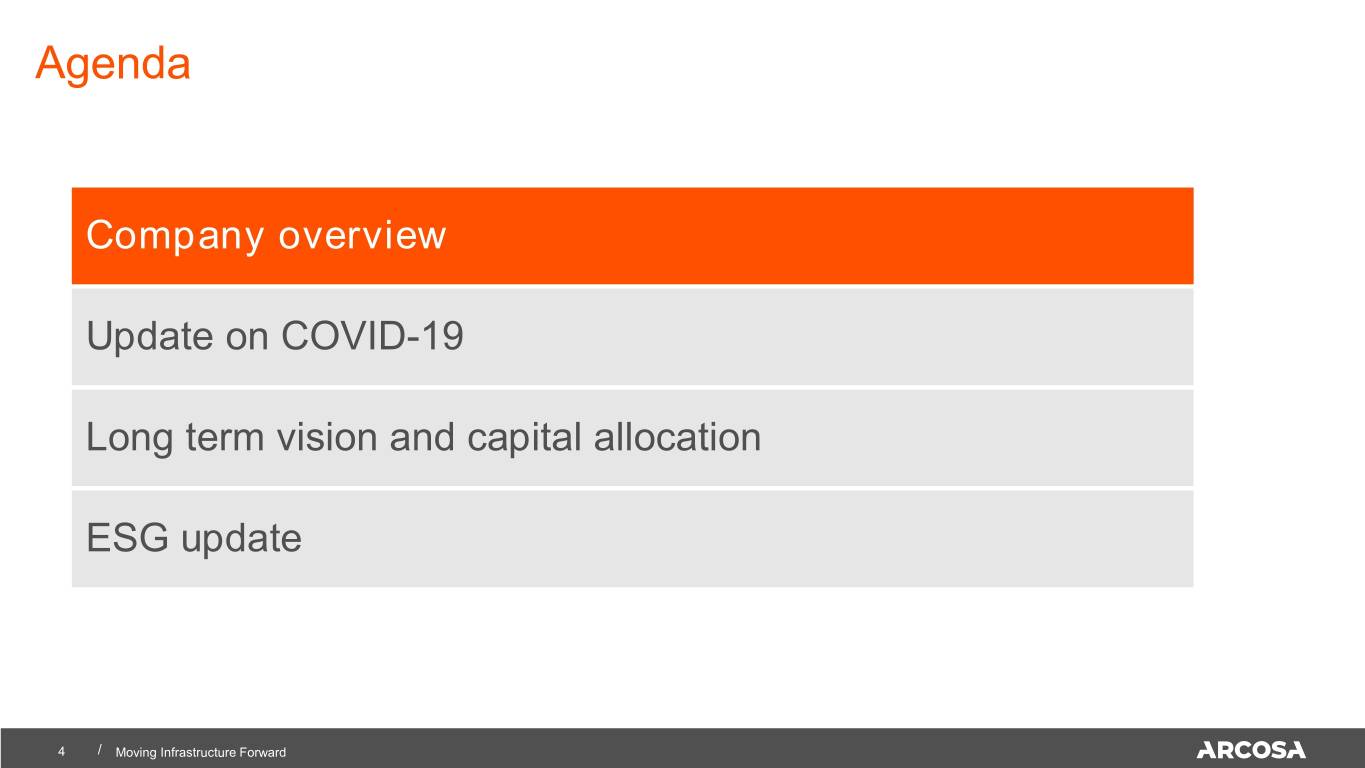
Agenda Company overview Update on COVID-19 Long term vision and capital allocation ESG update 4 / Moving Infrastructure Forward
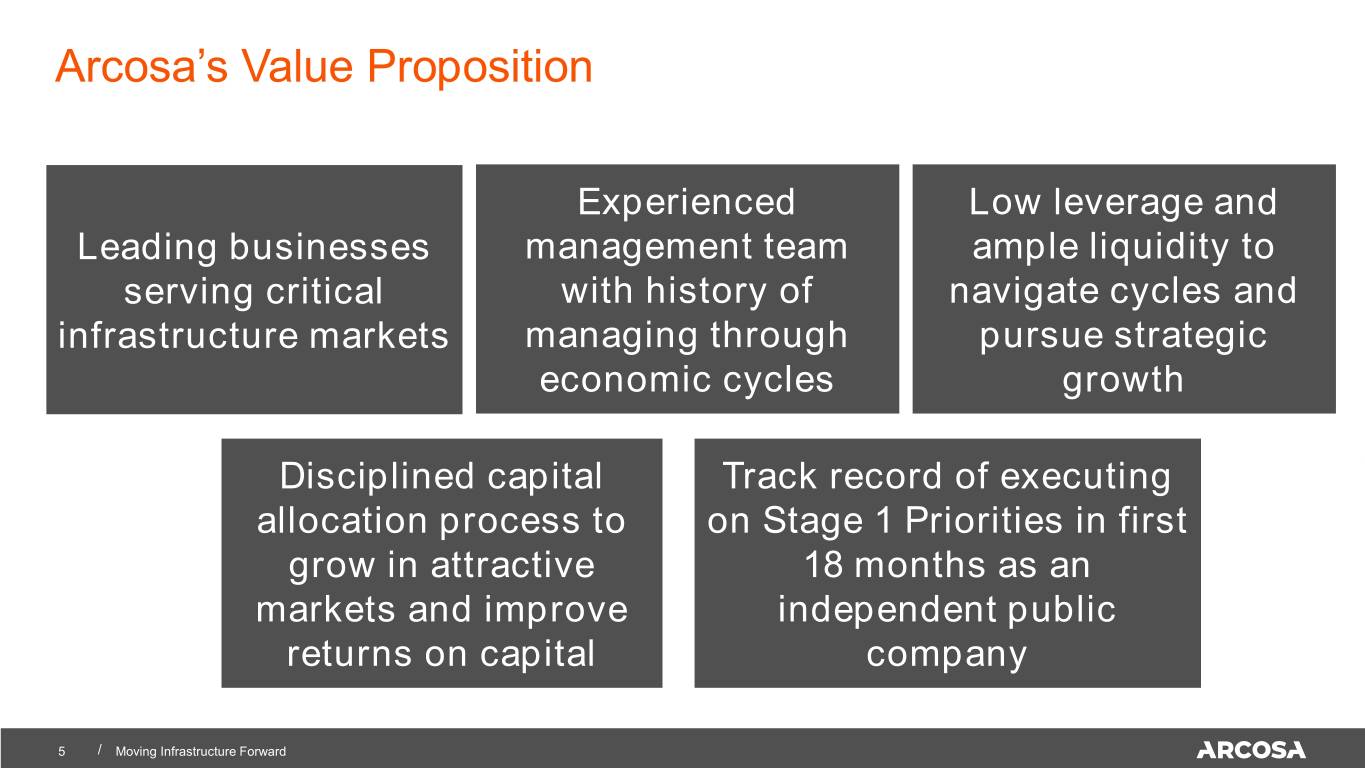
Arcosa’s Value Proposition Experienced Low leverage and Leading businesses management team ample liquidity to serving critical with history of navigate cycles and infrastructure markets managing through pursue strategic economic cycles growth Disciplined capital Track record of executing allocation process to on Stage 1 Priorities in first grow in attractive 18 months as an markets and improve independent public returns on capital company 5 / Moving Infrastructure Forward
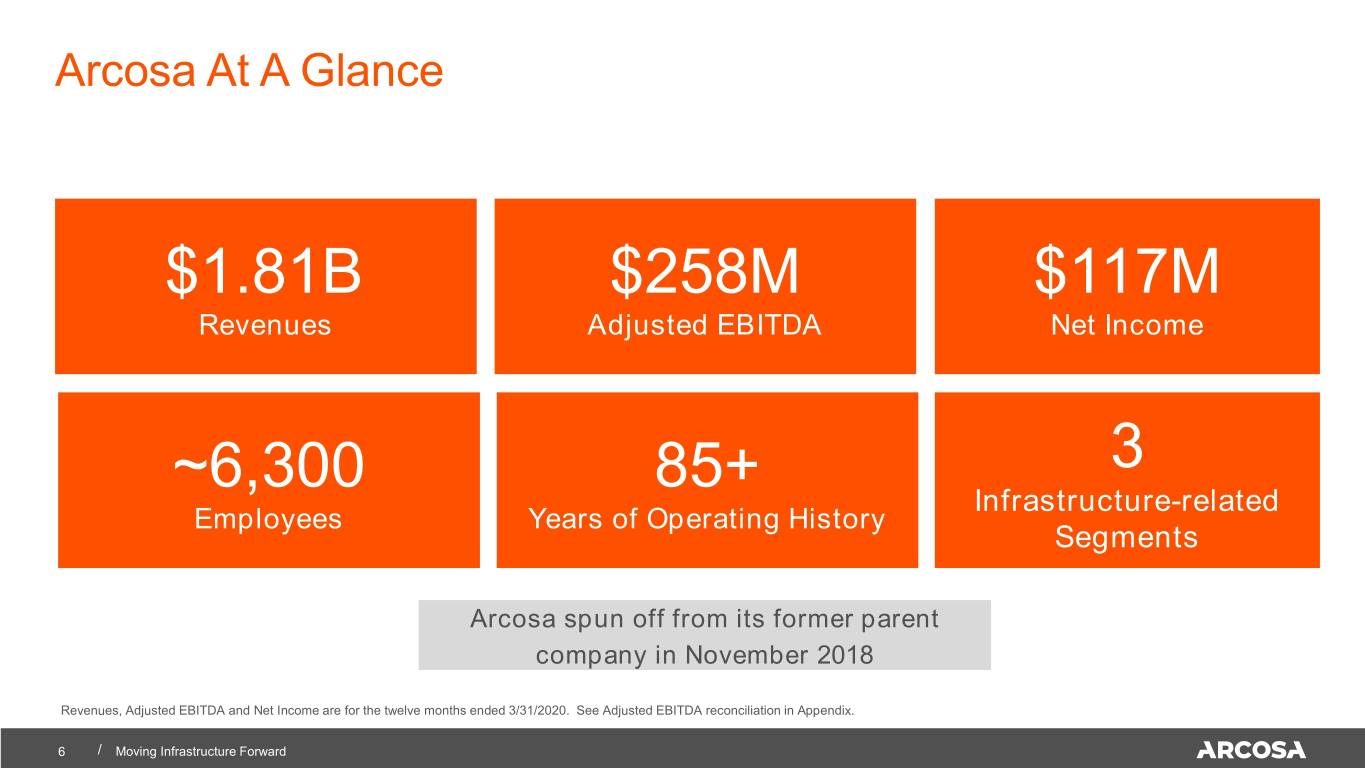
Arcosa At A Glance $1.81B $258M $117M Revenues Adjusted EBITDA Net Income 3 ~6,300 85+ Infrastructure-related Employees Years of Operating History Segments Arcosa spun off from its former parent company in November 2018 Revenues, Adjusted EBITDA and Net Income are for the twelve months ended 3/31/2020. See Adjusted EBITDA reconciliation in Appendix. 6 / Moving Infrastructure Forward
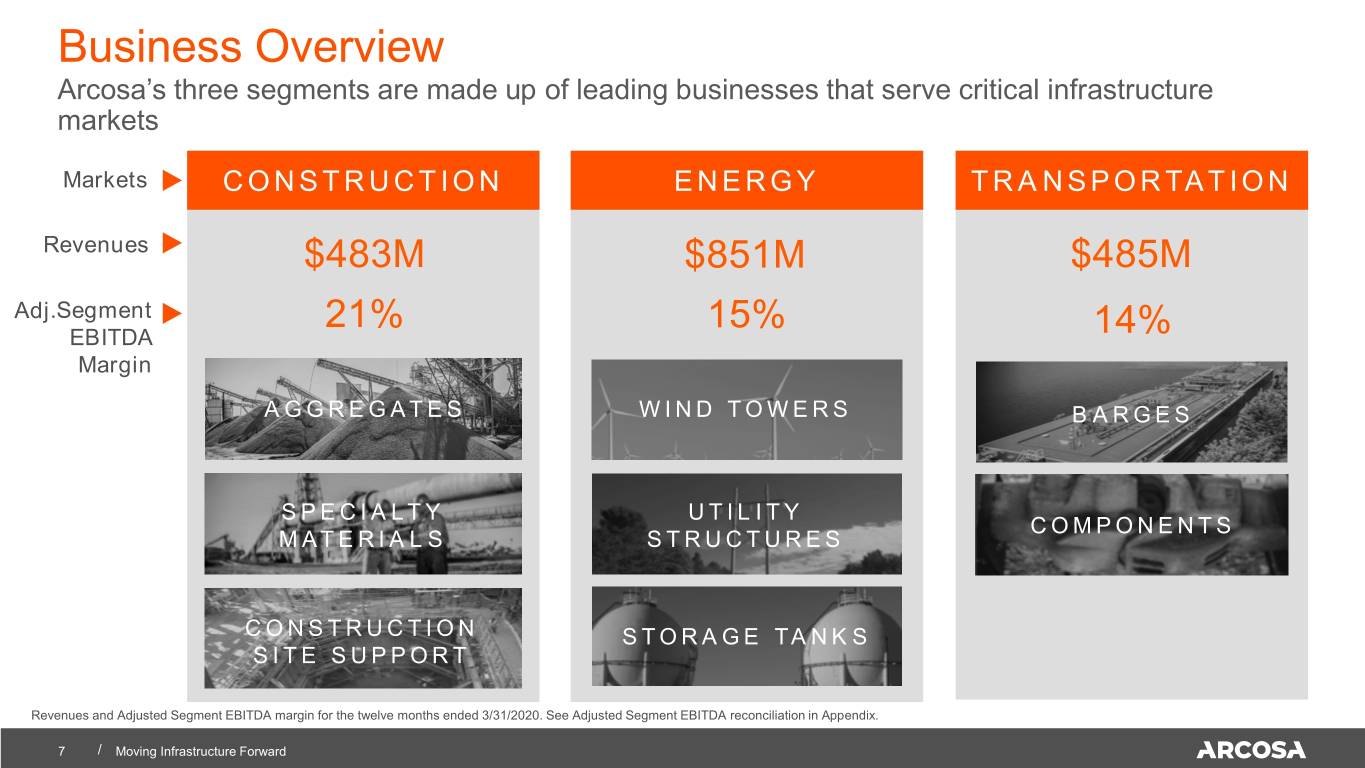
Business Overview Arcosa’s three segments are made up of leading businesses that serve critical infrastructure markets Markets CONSTRUCTION ENERGY TRANSPORTATION Revenues $483M $851M $485M Adj.Segment 21% 15% EBITDA 14% Margin AGGREGATES WIND TOWERS BARGES SPECIALTY UTILITY COMPONENTS MATERIALS STRUCTURES CONSTRUCTION STORAGE TANKS SITE SUPPORT Revenues and Adjusted Segment EBITDA margin for the twelve months ended 3/31/2020. See Adjusted Segment EBITDA reconciliation in Appendix. 7 / Moving Infrastructure Forward
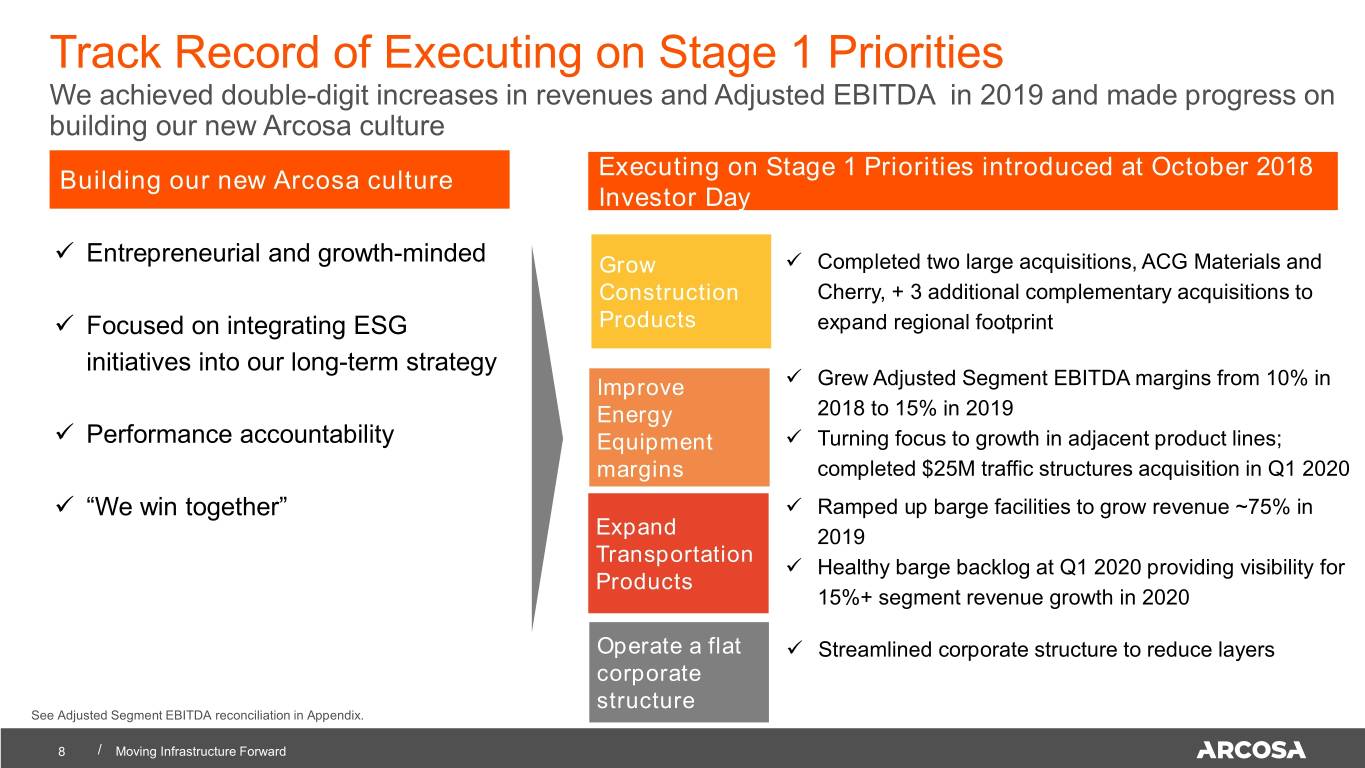
Track Record of Executing on Stage 1 Priorities We achieved double-digit increases in revenues and Adjusted EBITDA in 2019 and made progress on building our new Arcosa culture Executing on Stage 1 Priorities introduced at October 2018 Building our new Arcosa culture Investor Day Entrepreneurial and growth-minded Grow Completed two large acquisitions, ACG Materials and Construction Cherry, + 3 additional complementary acquisitions to Focused on integrating ESG Products expand regional footprint initiatives into our long-term strategy Improve Grew Adjusted Segment EBITDA margins from 10% in Energy 2018 to 15% in 2019 Performance accountability Equipment Turning focus to growth in adjacent product lines; margins completed $25M traffic structures acquisition in Q1 2020 “We win together” Ramped up barge facilities to grow revenue ~75% in Expand 2019 Transportation Healthy barge backlog at Q1 2020 providing visibility for Products 15%+ segment revenue growth in 2020 Operate a flat Streamlined corporate structure to reduce layers corporate structure See Adjusted Segment EBITDA reconciliation in Appendix. 8 / Moving Infrastructure Forward
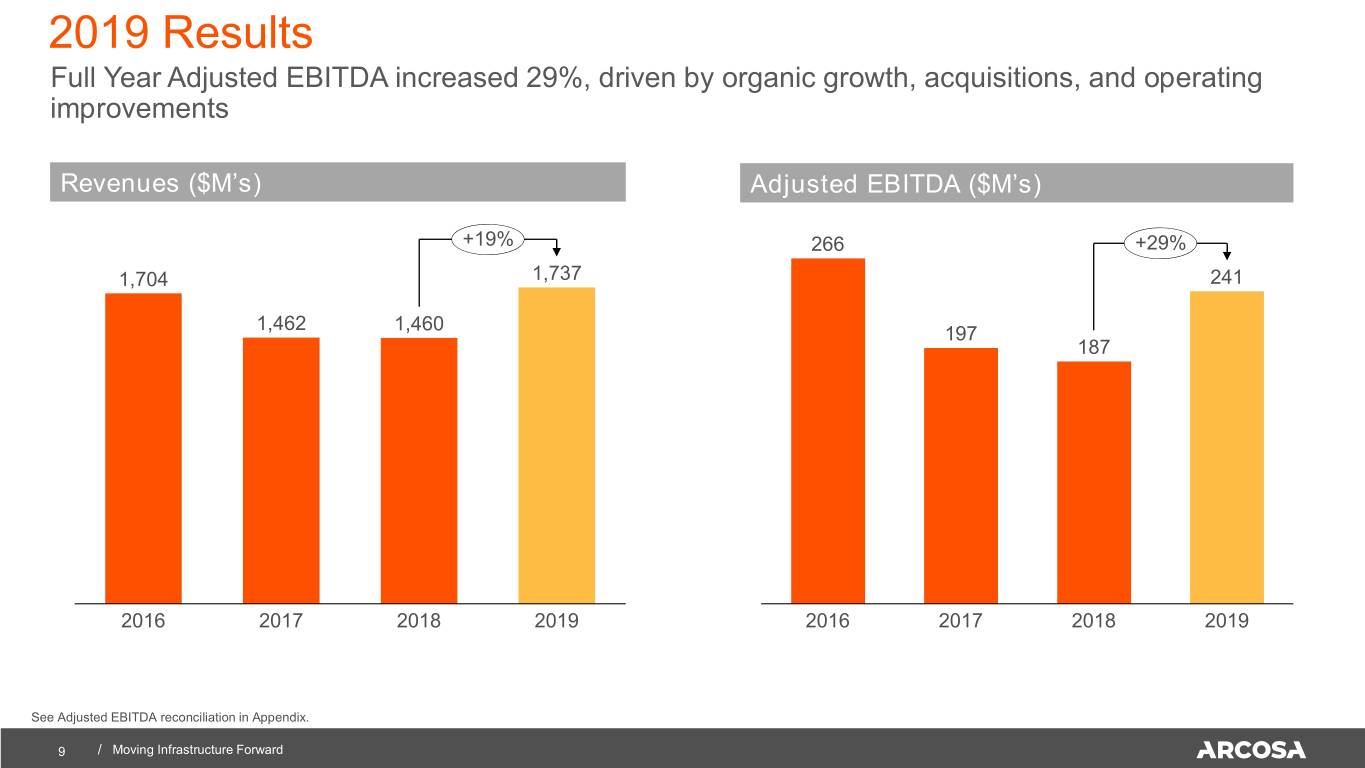
2019 Results Full Year Adjusted EBITDA increased 29%, driven by organic growth, acquisitions, and operating improvements Revenues ($M’s) Adjusted EBITDA ($M’s) +19% 266 +29% 1,704 1,737 241 1,462 1,460 197 187 2016 2017 2018 2019 2016 2017 2018 2019 See Adjusted EBITDA reconciliation in Appendix. 9 / Moving Infrastructure Forward
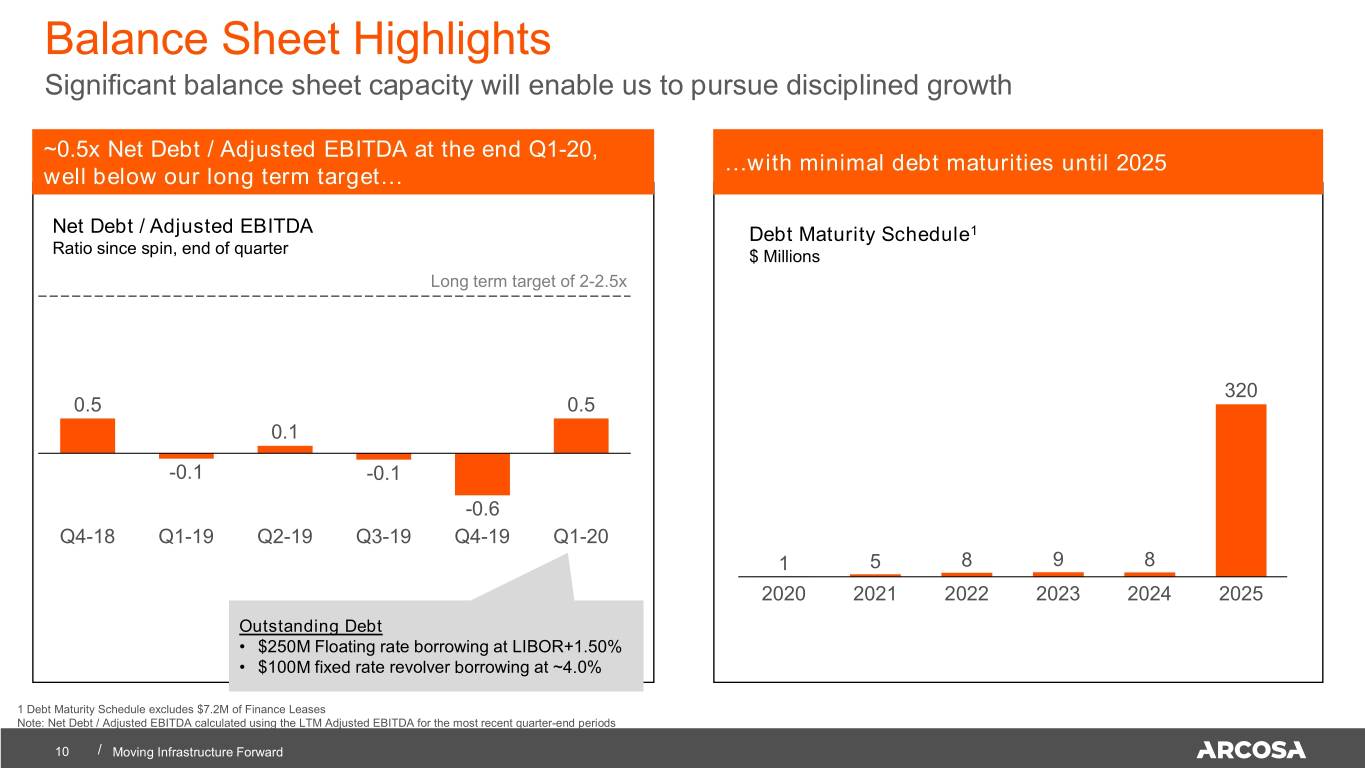
Balance Sheet Highlights Significant balance sheet capacity will enable us to pursue disciplined growth ~0.5x Net Debt / Adjusted EBITDA at the end Q1-20, …with minimal debt maturities until 2025 well below our long term target… Net Debt / Adjusted EBITDA Debt Maturity Schedule1 Ratio since spin, end of quarter $ Millions Long term target of 2-2.5x 320 0.5 0.5 0.1 -0.1 -0.1 -0.6 Q4-18 Q1-19 Q2-19 Q3-19 Q4-19 Q1-20 1 5 8 9 8 2020 2021 2022 2023 2024 2025 Outstanding Debt • $250M Floating rate borrowing at LIBOR+1.50% • $100M fixed rate revolver borrowing at ~4.0% 1 Debt Maturity Schedule excludes $7.2M of Finance Leases Note: Net Debt / Adjusted EBITDA calculated using the LTM Adjusted EBITDA for the most recent quarter-end periods 10 / Moving Infrastructure Forward
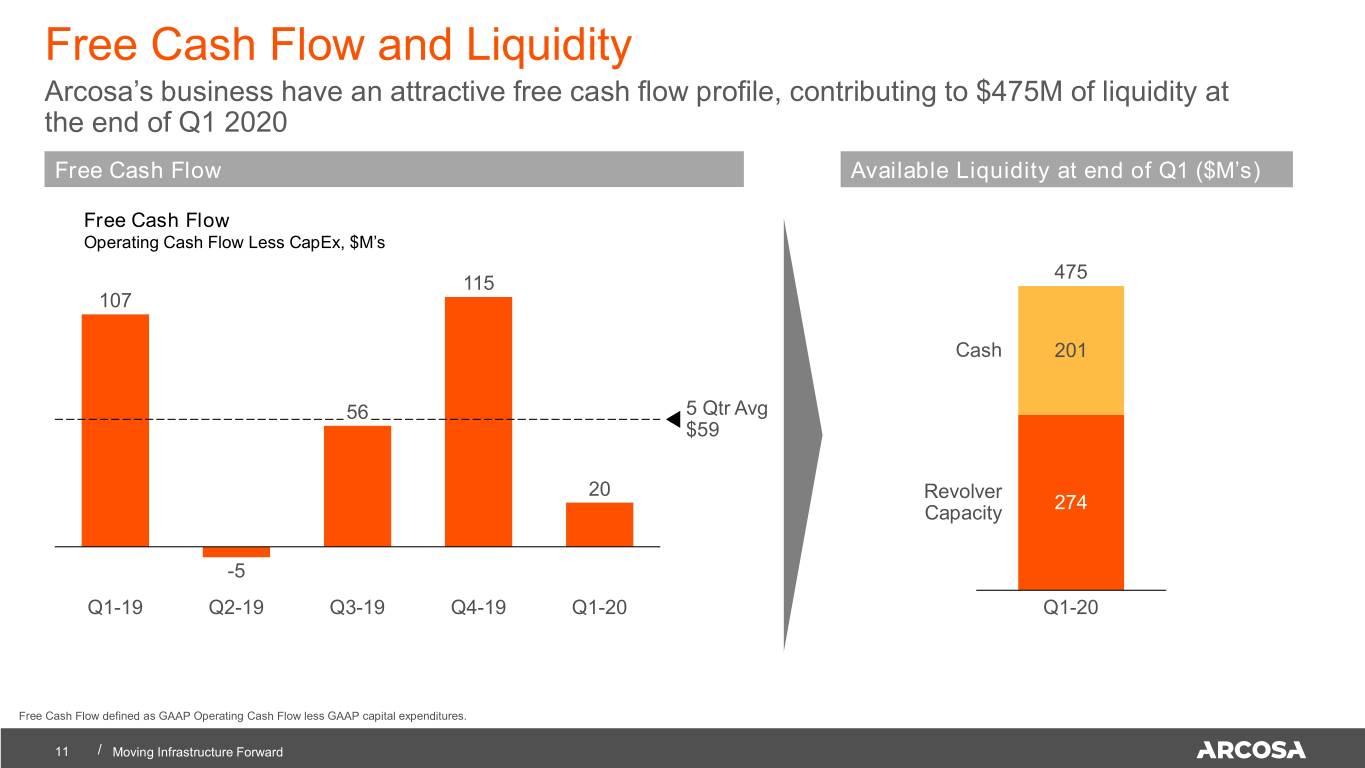
Free Cash Flow and Liquidity Arcosa’s business have an attractive free cash flow profile, contributing to $475M of liquidity at the end of Q1 2020 Free Cash Flow Available Liquidity at end of Q1 ($M’s) Free Cash Flow Operating Cash Flow Less CapEx, $M’s 475 115 107 Cash 201 56 5 Qtr Avg $59 20 Revolver 274 Capacity -5 Q1-19 Q2-19 Q3-19 Q4-19 Q1-20 Q1-20 Free Cash Flow defined as GAAP Operating Cash Flow less GAAP capital expenditures. 11 / Moving Infrastructure Forward
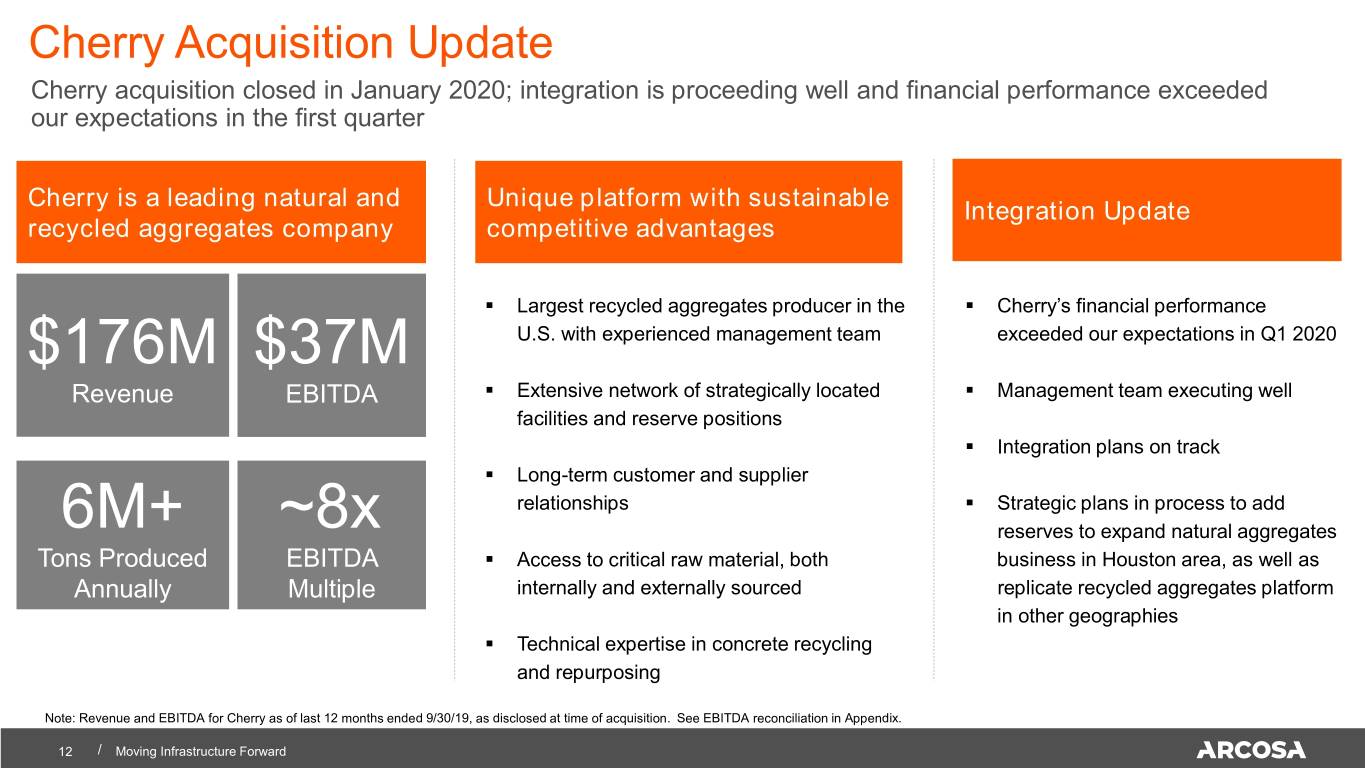
Cherry Acquisition Update Cherry acquisition closed in January 2020; integration is proceeding well and financial performance exceeded our expectations in the first quarter Cherry is a leading natural and Unique platform with sustainable Integration Update recycled aggregates company competitive advantages . Largest recycled aggregates producer in the . Cherry’s financial performance $176M $37M U.S. with experienced management team exceeded our expectations in Q1 2020 Revenue EBITDA . Extensive network of strategically located . Management team executing well facilities and reserve positions . Integration plans on track . Long-term customer and supplier relationships . Strategic plans in process to add 6M+ ~8x reserves to expand natural aggregates Tons Produced EBITDA . Access to critical raw material, both business in Houston area, as well as Annually Multiple internally and externally sourced replicate recycled aggregates platform in other geographies . Technical expertise in concrete recycling and repurposing Note: Revenue and EBITDA for Cherry as of last 12 months ended 9/30/19, as disclosed at time of acquisition. See EBITDA reconciliation in Appendix. 12 / Moving Infrastructure Forward
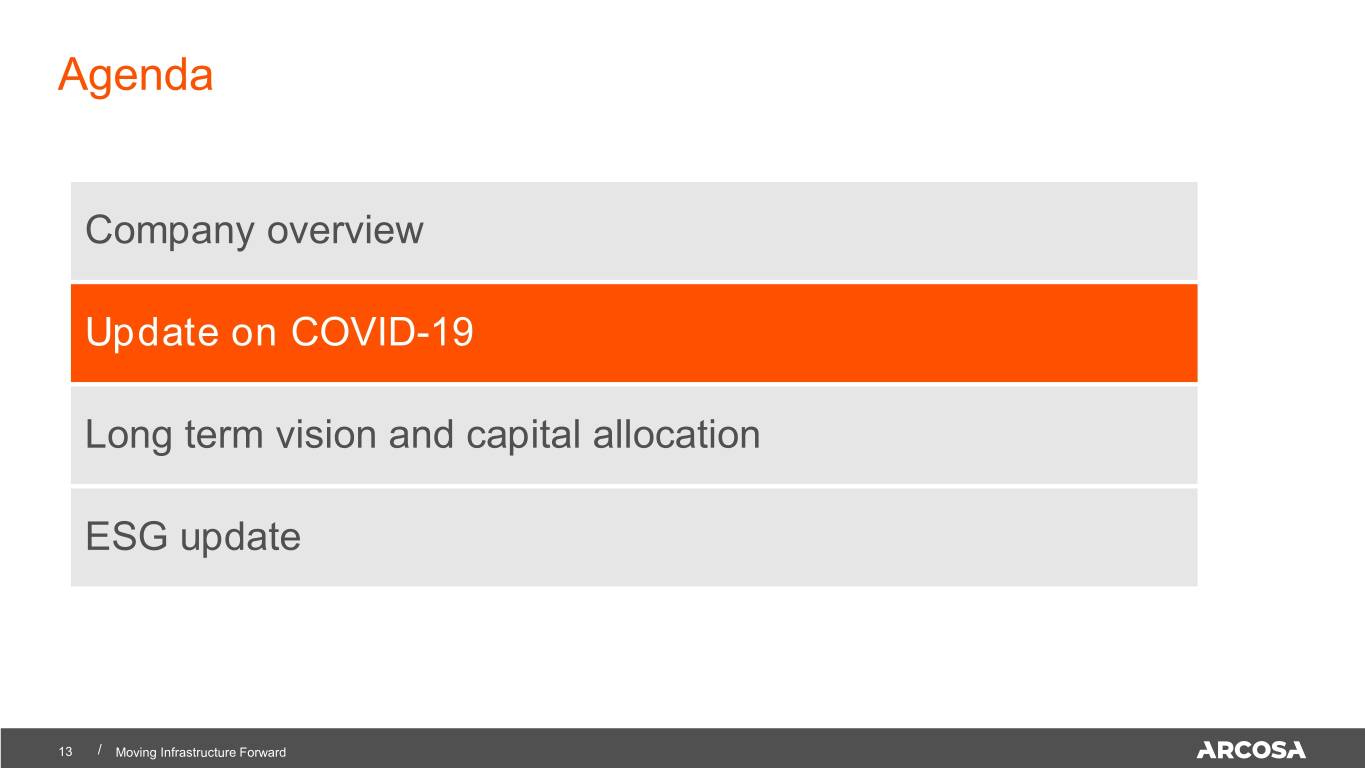
Agenda Company overview Update on COVID-19 Long term vision and capital allocation ESG update 13 / Moving Infrastructure Forward
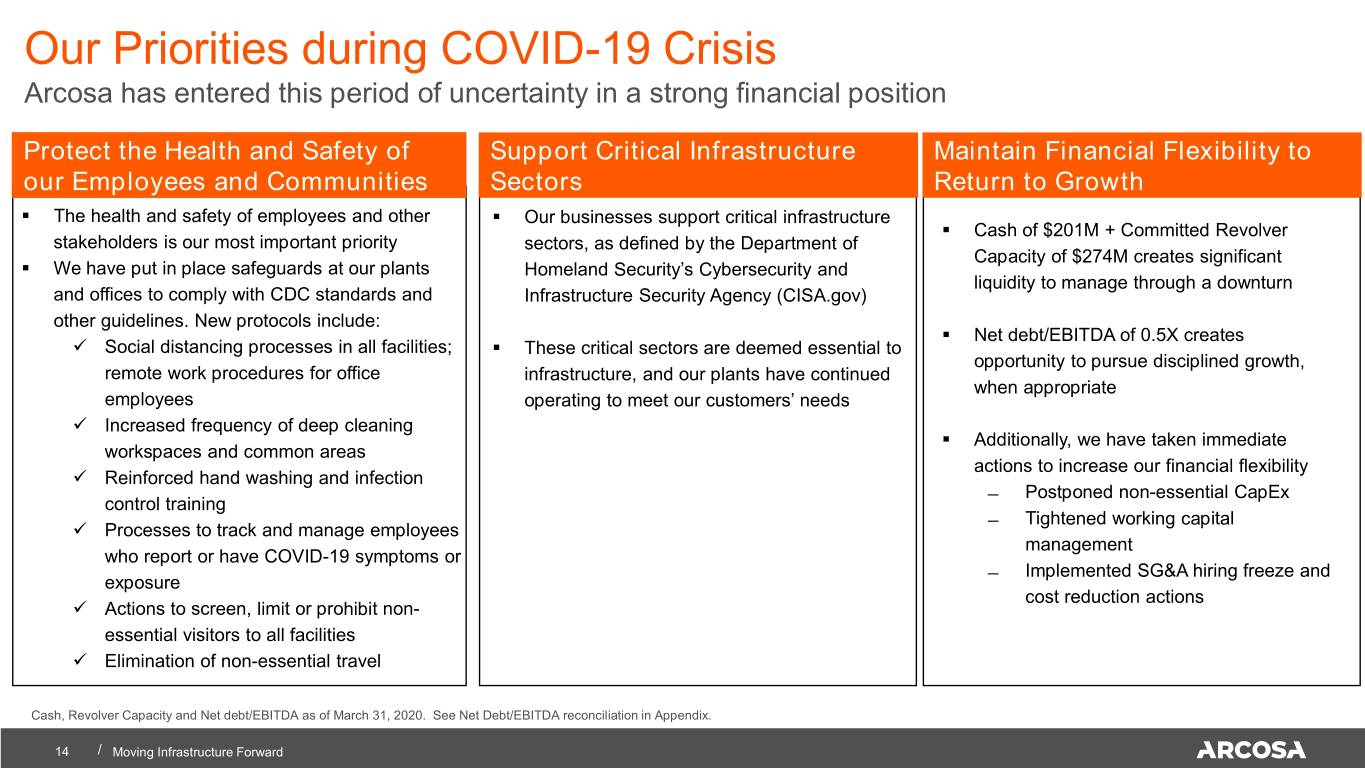
Our Priorities during COVID-19 Crisis Arcosa has entered this period of uncertainty in a strong financial position Protect the Health and Safety of Support Critical Infrastructure Maintain Financial Flexibility to our Employees and Communities Sectors Return to Growth . The health and safety of employees and other . Our businesses support critical infrastructure . Cash of $201M + Committed Revolver stakeholders is our most important priority sectors, as defined by the Department of Capacity of $274M creates significant . We have put in place safeguards at our plants Homeland Security’s Cybersecurity and liquidity to manage through a downturn and offices to comply with CDC standards and Infrastructure Security Agency (CISA.gov) other guidelines. New protocols include: . Net debt/EBITDA of 0.5X creates Social distancing processes in all facilities; . These critical sectors are deemed essential to opportunity to pursue disciplined growth, remote work procedures for office infrastructure, and our plants have continued when appropriate employees operating to meet our customers’ needs Increased frequency of deep cleaning . Additionally, we have taken immediate workspaces and common areas actions to increase our financial flexibility Reinforced hand washing and infection ̶ Postponed non-essential CapEx control training ̶ Tightened working capital Processes to track and manage employees management who report or have COVID-19 symptoms or ̶ Implemented SG&A hiring freeze and exposure cost reduction actions Actions to screen, limit or prohibit non- essential visitors to all facilities Elimination of non-essential travel Cash, Revolver Capacity and Net debt/EBITDA as of March 31, 2020. See Net Debt/EBITDA reconciliation in Appendix. 14 / Moving Infrastructure Forward
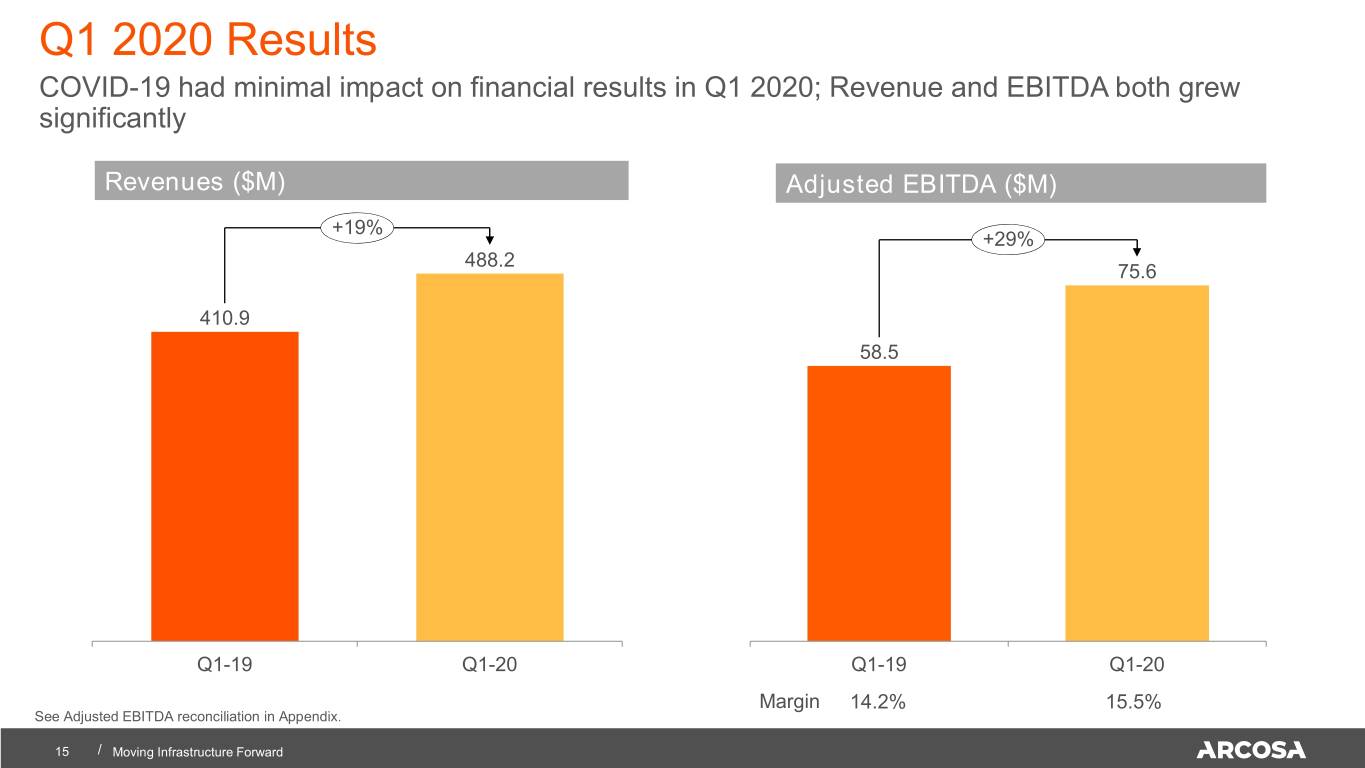
Q1 2020 Results COVID-19 had minimal impact on financial results in Q1 2020; Revenue and EBITDA both grew significantly Revenues ($M) Adjusted EBITDA ($M) +19% +29% 488.2 75.6 410.9 58.5 Q1-19 Q1-20 Q1-19 Q1-20 Margin 14.2% 15.5% See Adjusted EBITDA reconciliation in Appendix. 15 / Moving Infrastructure Forward
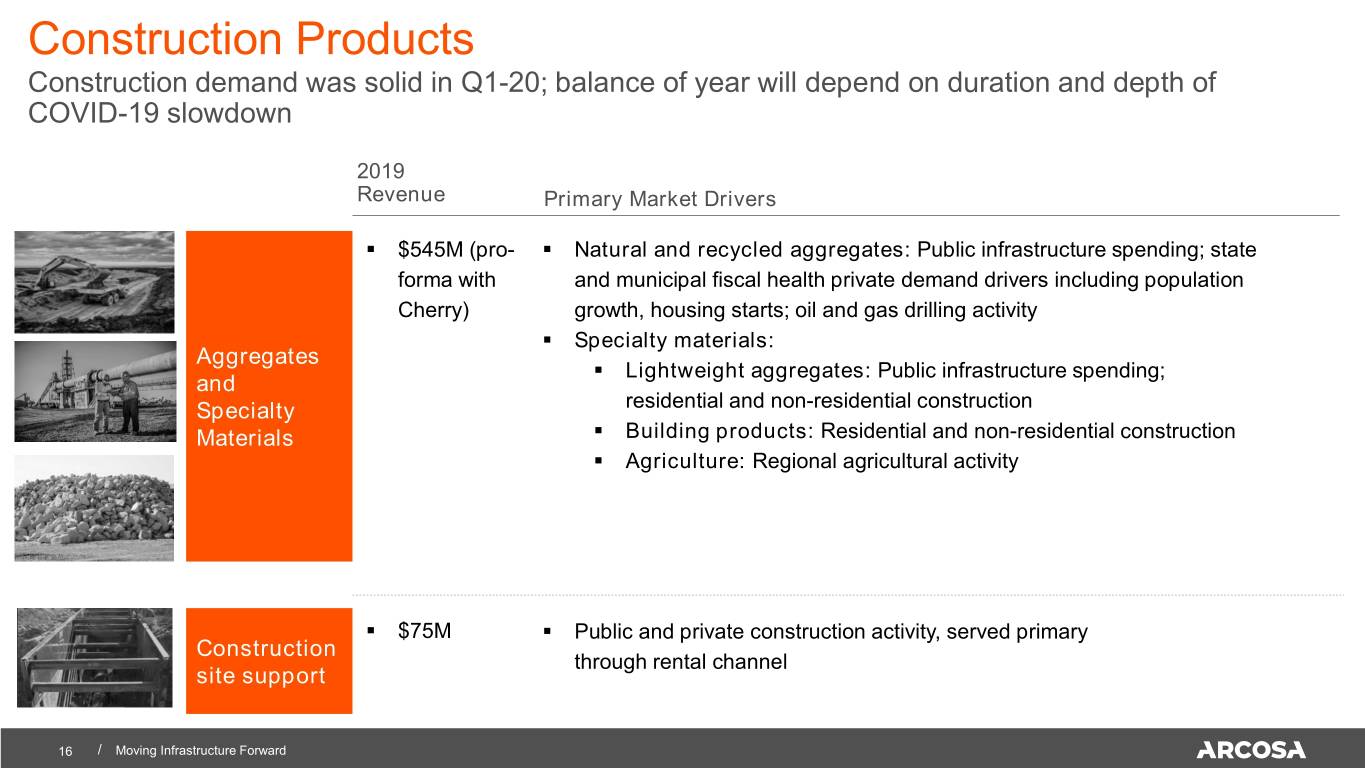
Construction Products Construction demand was solid in Q1-20; balance of year will depend on duration and depth of COVID-19 slowdown 2019 Revenue Primary Market Drivers . $545M (pro- . Natural and recycled aggregates: Public infrastructure spending; state forma with and municipal fiscal health private demand drivers including population Cherry) growth, housing starts; oil and gas drilling activity . Specialty materials: Aggregates . Lightweight aggregates: Public infrastructure spending; and residential and non-residential construction Specialty Materials . Building products: Residential and non-residential construction . Agriculture: Regional agricultural activity . $75M . Public and private construction activity, served primary Construction through rental channel site support 16 / Moving Infrastructure Forward
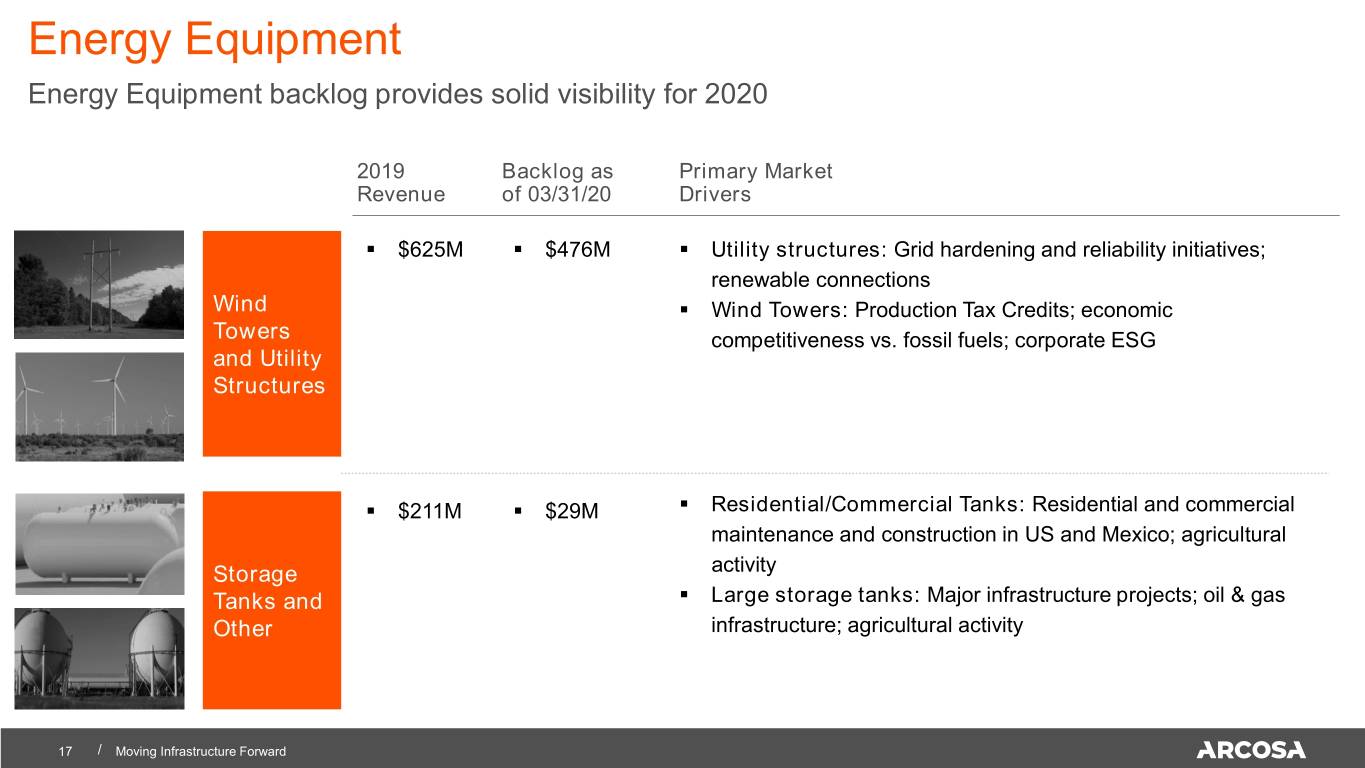
Energy Equipment Energy Equipment backlog provides solid visibility for 2020 2019 Backlog as Primary Market Revenue of 03/31/20 Drivers . $625M . $476M . Utility structures: Grid hardening and reliability initiatives; renewable connections Wind . Wind Towers: Production Tax Credits; economic Towers competitiveness vs. fossil fuels; corporate ESG and Utility Structures . $211M . $29M . Residential/Commercial Tanks: Residential and commercial maintenance and construction in US and Mexico; agricultural Storage activity Tanks and . Large storage tanks: Major infrastructure projects; oil & gas Other infrastructure; agricultural activity 17 / Moving Infrastructure Forward
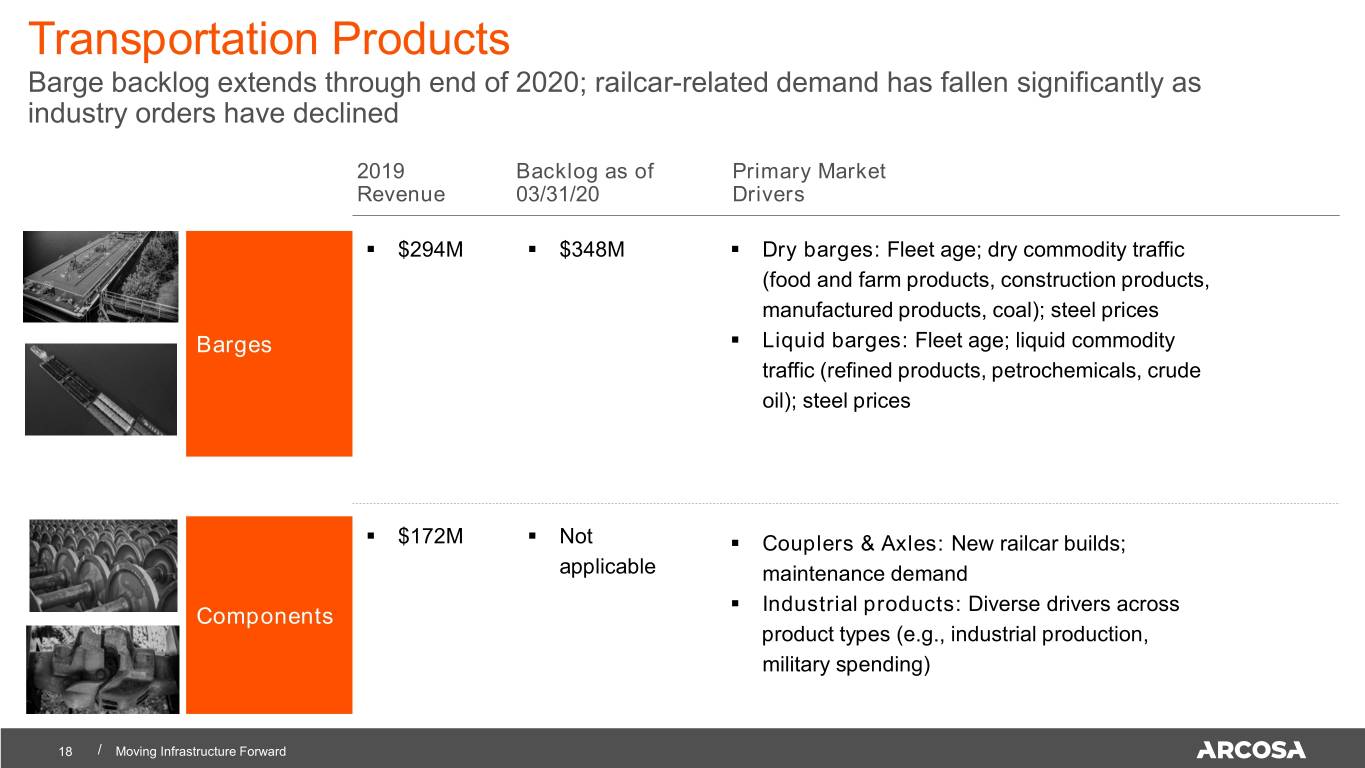
Transportation Products Barge backlog extends through end of 2020; railcar-related demand has fallen significantly as industry orders have declined 2019 Backlog as of Primary Market Revenue 03/31/20 Drivers . $294M . $348M . Dry barges: Fleet age; dry commodity traffic (food and farm products, construction products, manufactured products, coal); steel prices Barges . Liquid barges: Fleet age; liquid commodity traffic (refined products, petrochemicals, crude oil); steel prices . . $172M Not . Couplers & Axles: New railcar builds; applicable maintenance demand . Industrial products: Diverse drivers across Components product types (e.g., industrial production, military spending) 18 / Moving Infrastructure Forward
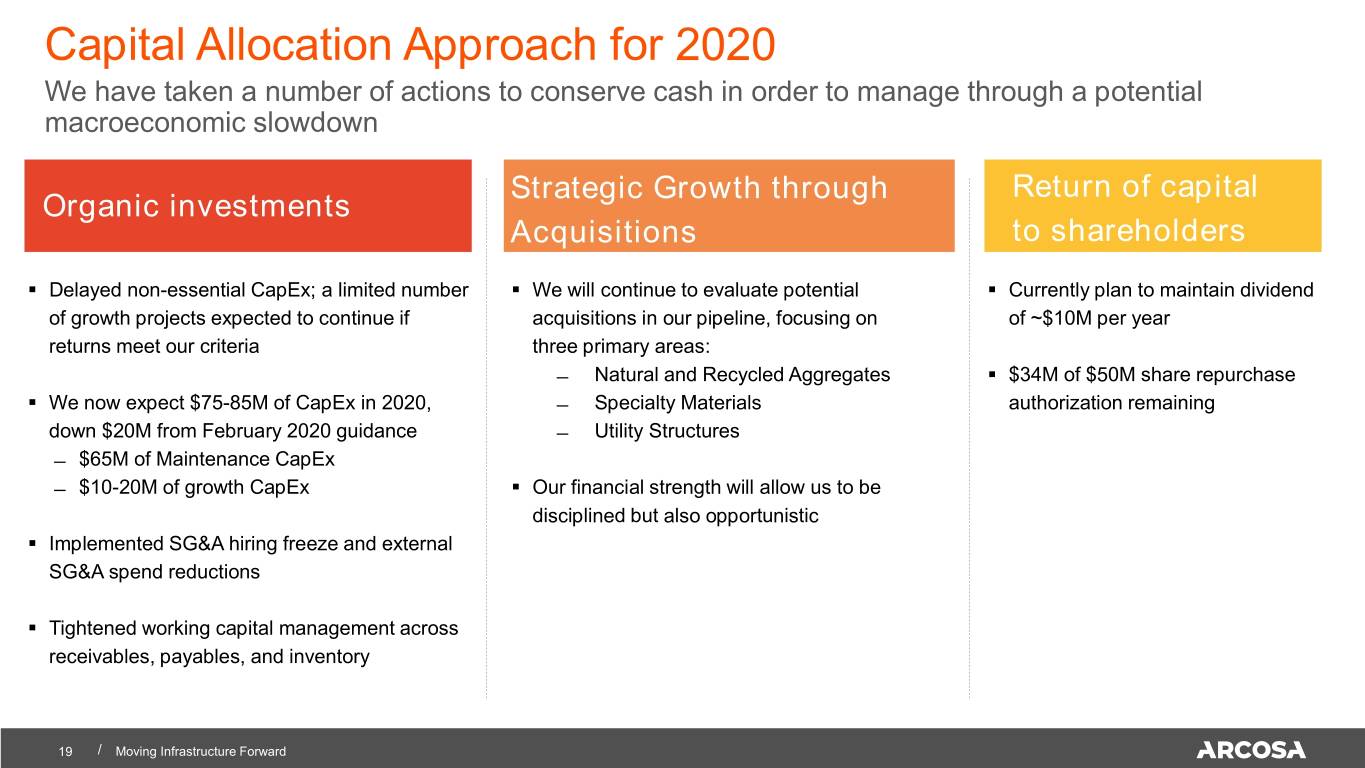
Capital Allocation Approach for 2020 We have taken a number of actions to conserve cash in order to manage through a potential macroeconomic slowdown Strategic Growth through Return of capital Organic investments Acquisitions to shareholders . Delayed non-essential CapEx; a limited number . We will continue to evaluate potential . Currently plan to maintain dividend of growth projects expected to continue if acquisitions in our pipeline, focusing on of ~$10M per year returns meet our criteria three primary areas: ̶ Natural and Recycled Aggregates . $34M of $50M share repurchase . We now expect $75-85M of CapEx in 2020, ̶ Specialty Materials authorization remaining down $20M from February 2020 guidance ̶ Utility Structures ̶ $65M of Maintenance CapEx ̶ $10-20M of growth CapEx . Our financial strength will allow us to be disciplined but also opportunistic . Implemented SG&A hiring freeze and external SG&A spend reductions . Tightened working capital management across receivables, payables, and inventory 19 / Moving Infrastructure Forward
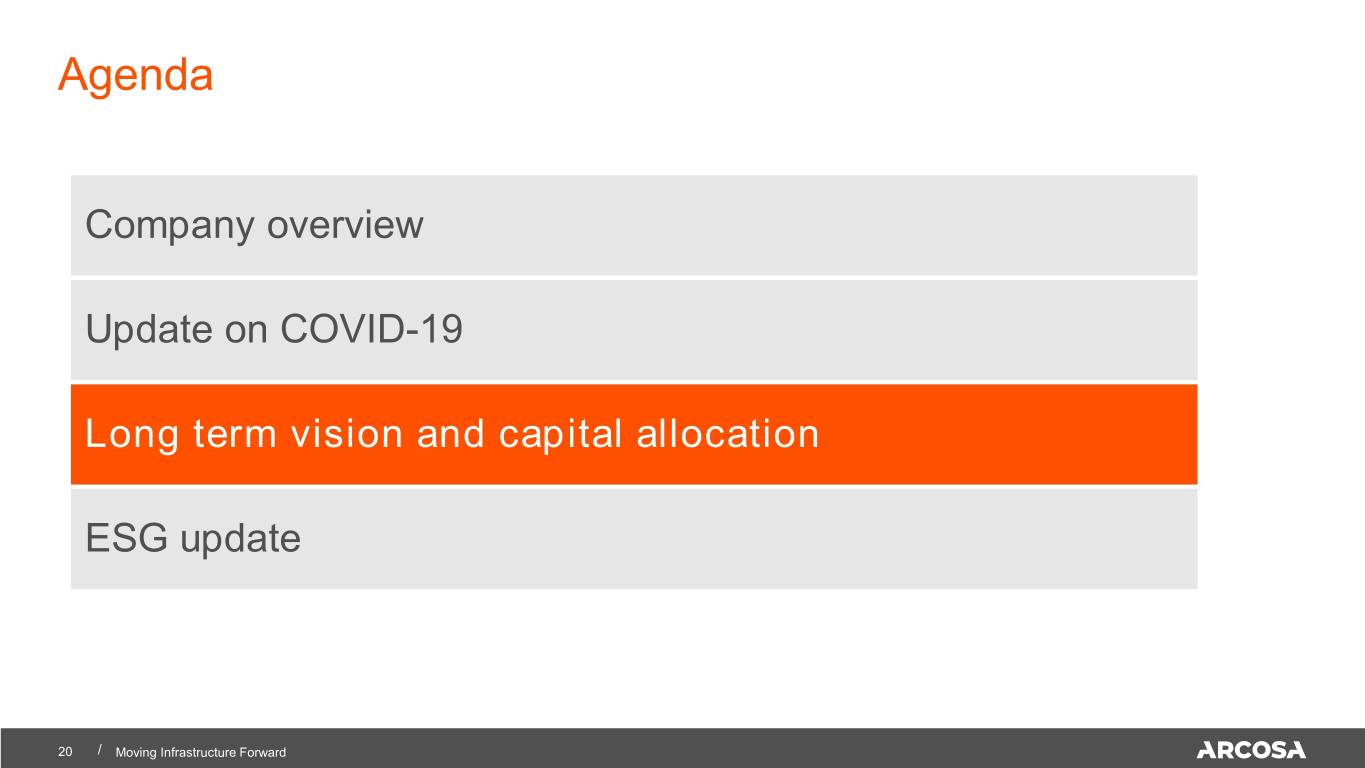
Agenda Company overview Update on COVID-19 Long term vision and capital allocation ESG update 20 / Moving Infrastructure Forward
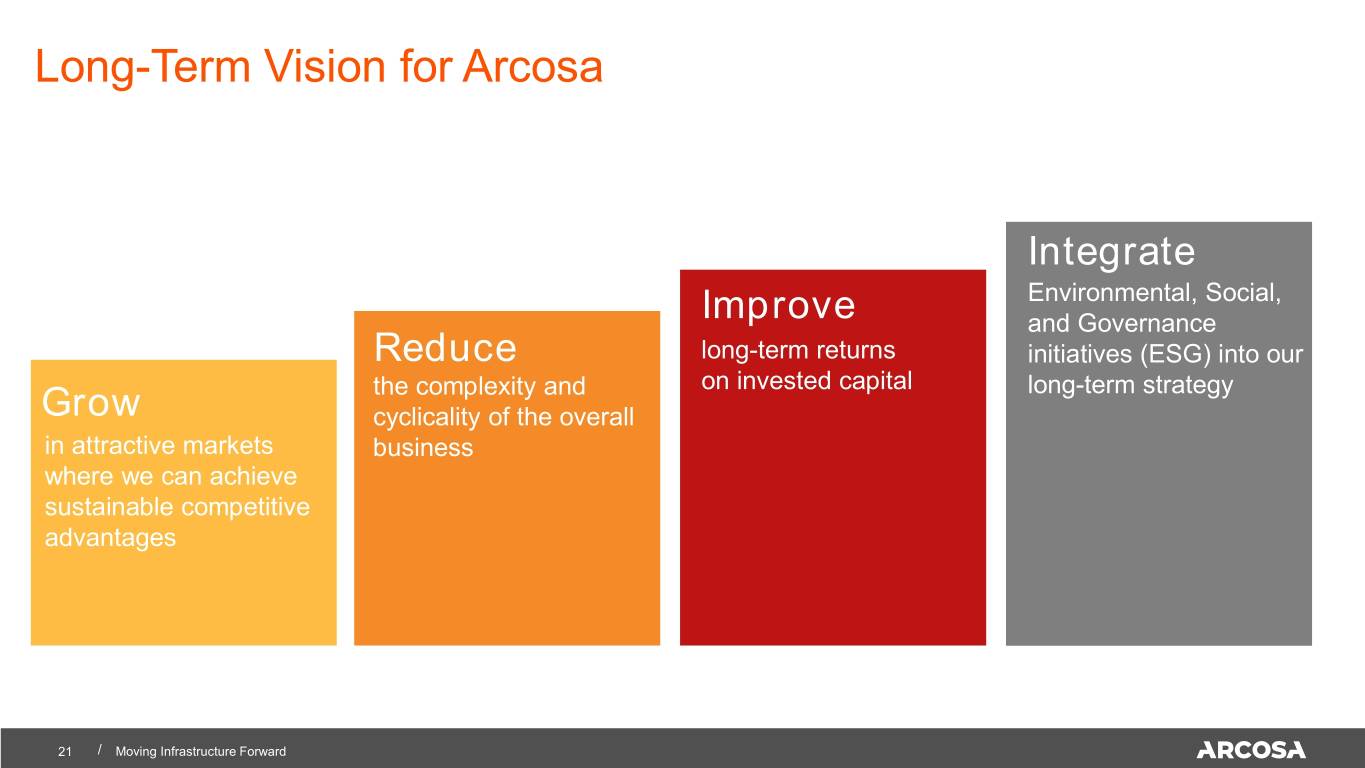
Long-Term Vision for Arcosa Integrate Environmental, Social, Improve and Governance Reduce long-term returns initiatives (ESG) into our the complexity and on invested capital long-term strategy Grow cyclicality of the overall in attractive markets business where we can achieve sustainable competitive advantages 21 / Moving Infrastructure Forward
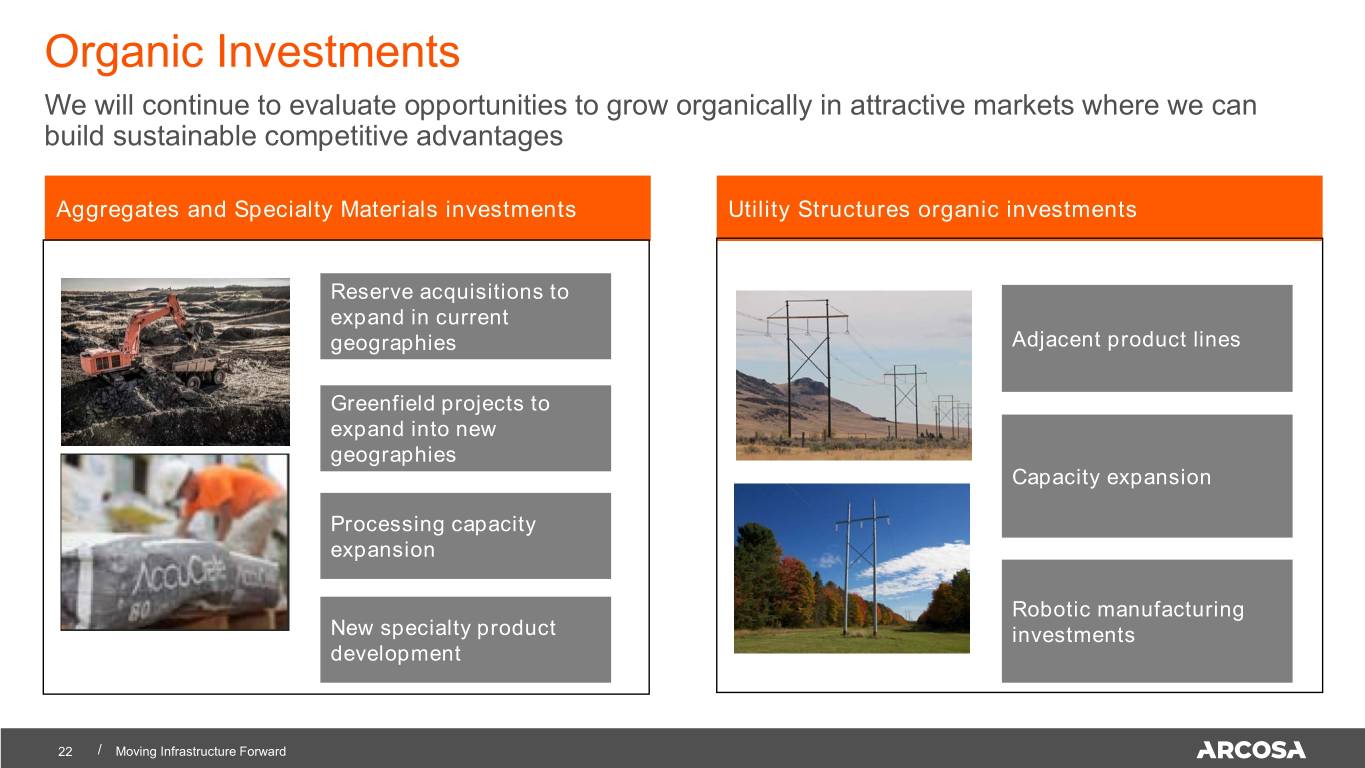
Organic Investments We will continue to evaluate opportunities to grow organically in attractive markets where we can build sustainable competitive advantages Aggregates and Specialty Materials investments Utility Structures organic investments Reserve acquisitions to expand in current geographies Adjacent product lines Greenfield projects to expand into new geographies Capacity expansion Processing capacity expansion Robotic manufacturing New specialty product investments development 22 / Moving Infrastructure Forward
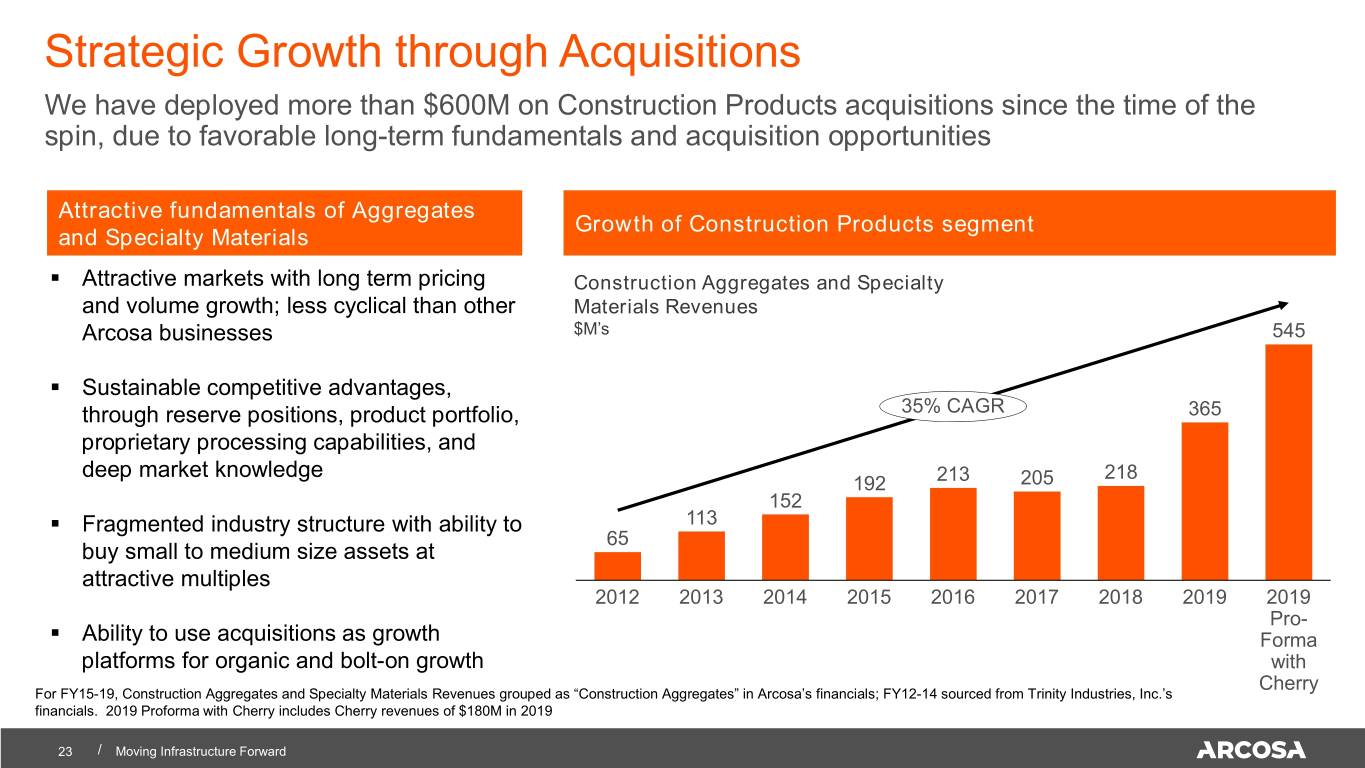
Strategic Growth through Acquisitions We have deployed more than $600M on Construction Products acquisitions since the time of the spin, due to favorable long-term fundamentals and acquisition opportunities Attractive fundamentals of Aggregates Growth of Construction Products segment and Specialty Materials . Attractive markets with long term pricing Construction Aggregates and Specialty and volume growth; less cyclical than other Materials Revenues Arcosa businesses $M’s 545 . Sustainable competitive advantages, through reserve positions, product portfolio, 35% CAGR 365 proprietary processing capabilities, and deep market knowledge 218 192 213 205 152 . Fragmented industry structure with ability to 113 65 buy small to medium size assets at attractive multiples 2012 2013 2014 2015 2016 2017 2018 2019 2019 Pro- . Ability to use acquisitions as growth Forma platforms for organic and bolt-on growth with For FY15-19, Construction Aggregates and Specialty Materials Revenues grouped as “Construction Aggregates” in Arcosa’s financials; FY12-14 sourced from Trinity Industries, Inc.’s Cherry financials. 2019 Proforma with Cherry includes Cherry revenues of $180M in 2019 23 / Moving Infrastructure Forward
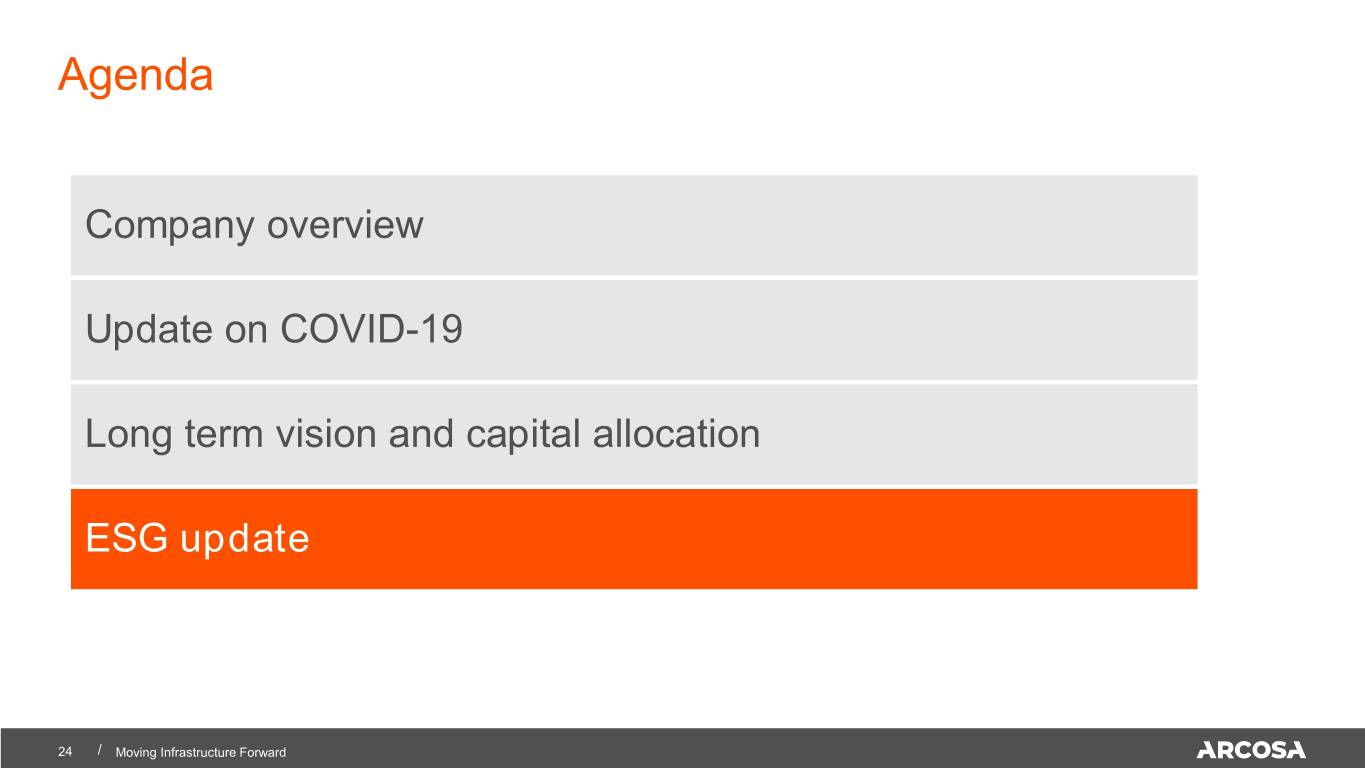
Agenda Company overview Update on COVID-19 Long term vision and capital allocation ESG update 24 / Moving Infrastructure Forward
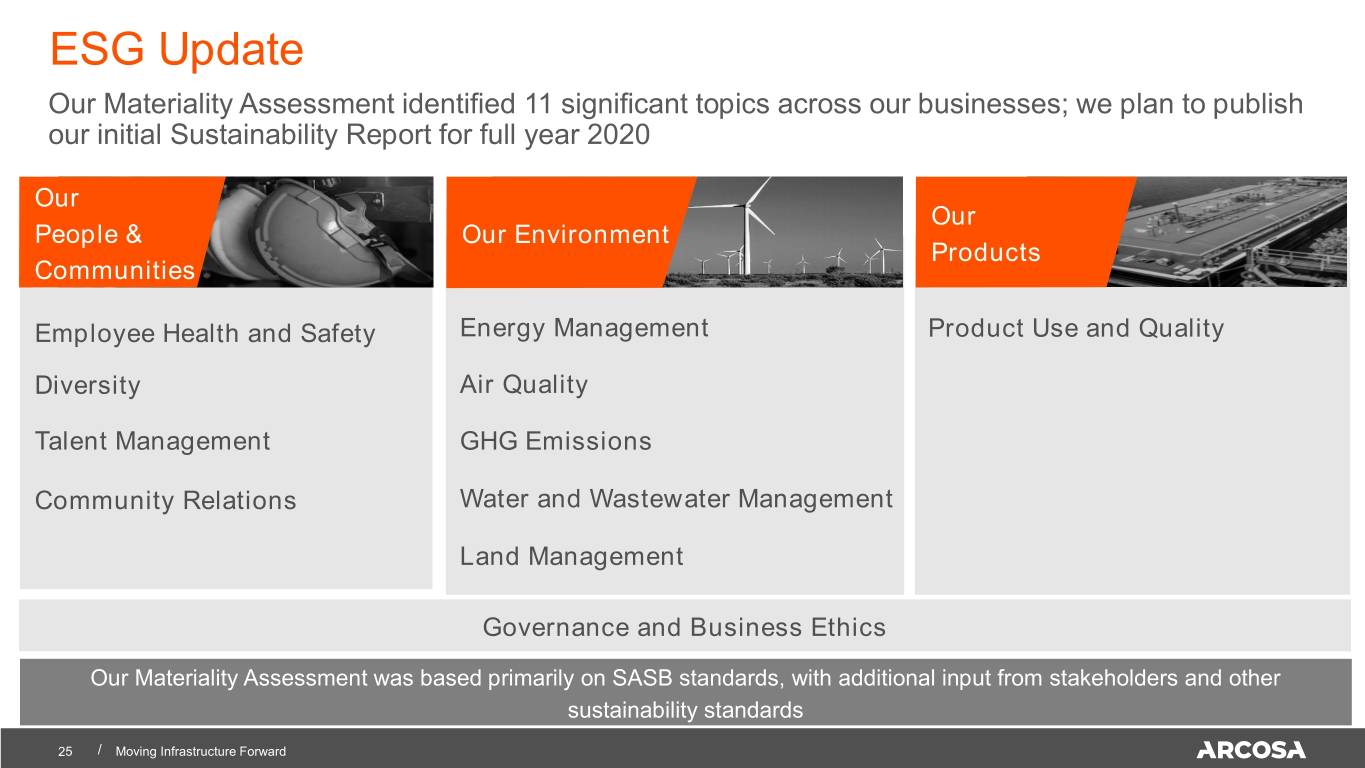
ESG Update Our Materiality Assessment identified 11 significant topics across our businesses; we plan to publish our initial Sustainability Report for full year 2020 Our Our People & Our Environment Products Communities Employee Health and Safety Energy Management Product Use and Quality Diversity Air Quality Talent Management GHG Emissions Community Relations Water and Wastewater Management Land Management Governance and Business Ethics Our Materiality Assessment was based primarily on SASB standards, with additional input from stakeholders and other sustainability standards 25 / Moving Infrastructure Forward
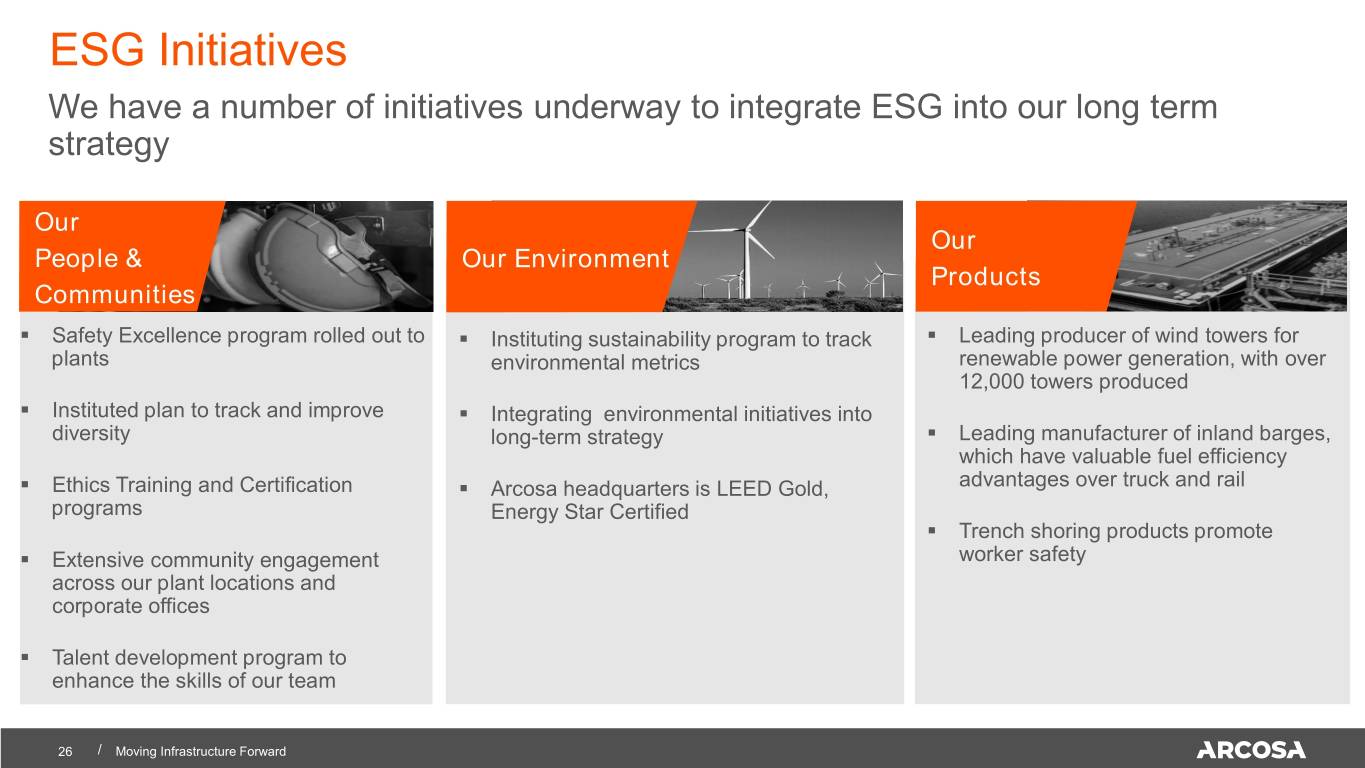
ESG Initiatives We have a number of initiatives underway to integrate ESG into our long term strategy Our Our People & Our Environment Products Communities . Safety Excellence program rolled out to . Instituting sustainability program to track . Leading producer of wind towers for plants environmental metrics renewable power generation, with over 12,000 towers produced . Instituted plan to track and improve . Integrating environmental initiatives into diversity long-term strategy . Leading manufacturer of inland barges, which have valuable fuel efficiency . Ethics Training and Certification . Arcosa headquarters is LEED Gold, advantages over truck and rail programs Energy Star Certified . Trench shoring products promote . Extensive community engagement worker safety across our plant locations and corporate offices . Talent development program to enhance the skills of our team 26 / Moving Infrastructure Forward
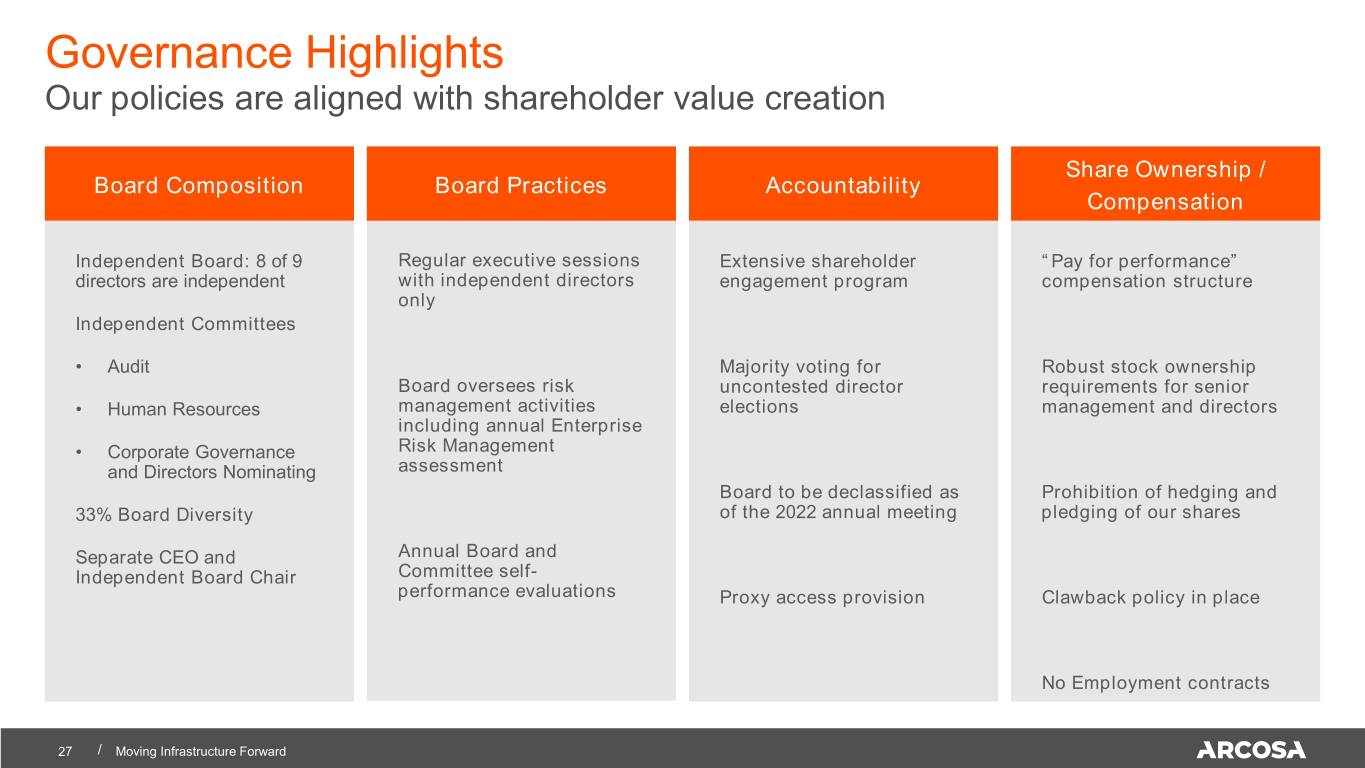
Governance Highlights Our policies are aligned with shareholder value creation Share Ownership / Board Composition Board Practices Accountability Compensation Independent Board: 8 of 9 Regular executive sessions Extensive shareholder “Pay for performance” directors are independent with independent directors engagement program compensation structure only Independent Committees • Audit Majority voting for Robust stock ownership Board oversees risk uncontested director requirements for senior • Human Resources management activities elections management and directors including annual Enterprise • Corporate Governance Risk Management and Directors Nominating assessment Board to be declassified as Prohibition of hedging and 33% Board Diversity of the 2022 annual meeting pledging of our shares Separate CEO and Annual Board and Independent Board Chair Committee self- performance evaluations Proxy access provision Clawback policy in place No Employment contracts 27 / Moving Infrastructure Forward
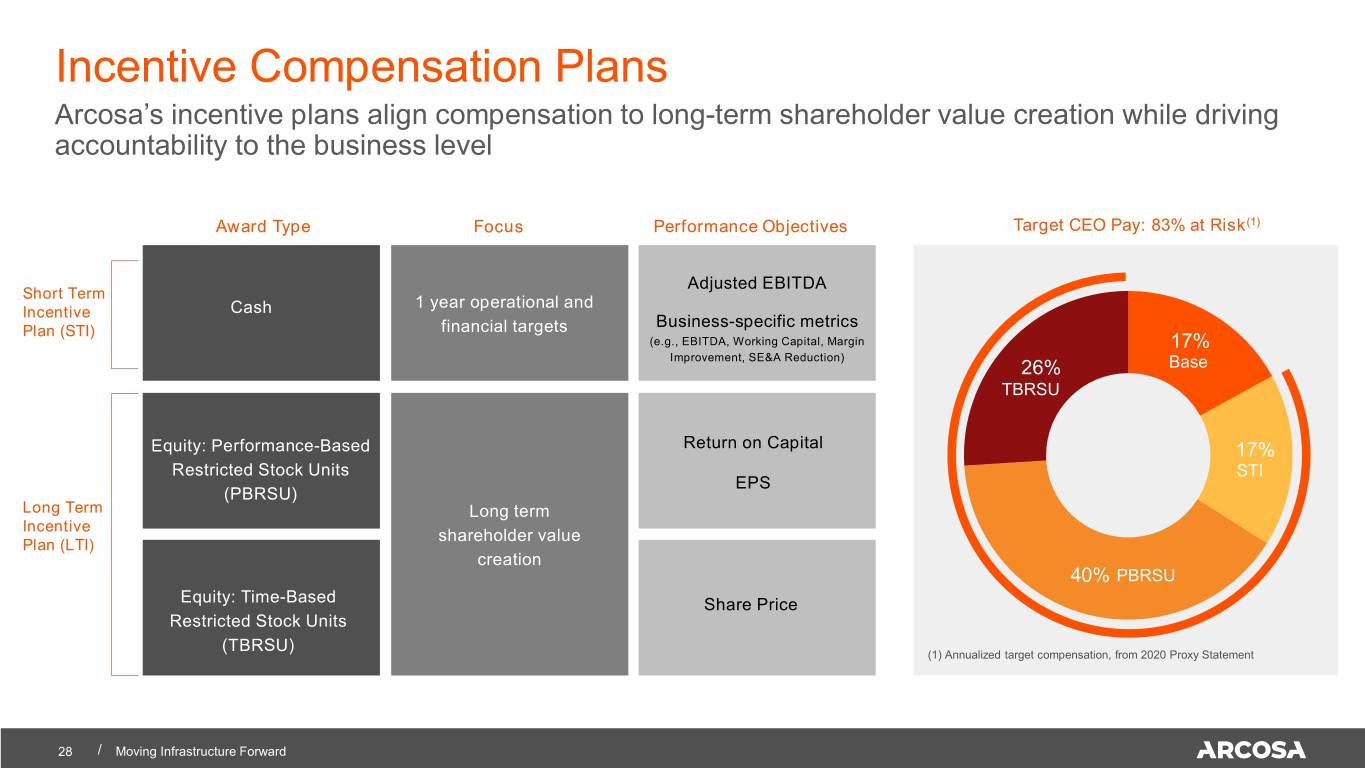
Incentive Compensation Plans Arcosa’s incentive plans align compensation to long-term shareholder value creation while driving accountability to the business level Award Type Focus Performance Objectives Target CEO Pay: 83% at Risk(1) Adjusted EBITDA Short Term Cash 1 year operational and Incentive Business-specific metrics Plan (STI) financial targets (e.g., EBITDA, Working Capital, Margin 17% Improvement, SE&A Reduction) 26% Base TBRSU Equity: Performance-Based Return on Capital 17% Restricted Stock Units STI EPS (PBRSU) Long Term Long term Incentive shareholder value Plan (LTI) creation 40% PBRSU Equity: Time-Based Share Price Restricted Stock Units (TBRSU) (1) Annualized target compensation, from 2020 Proxy Statement 28 / Moving Infrastructure Forward
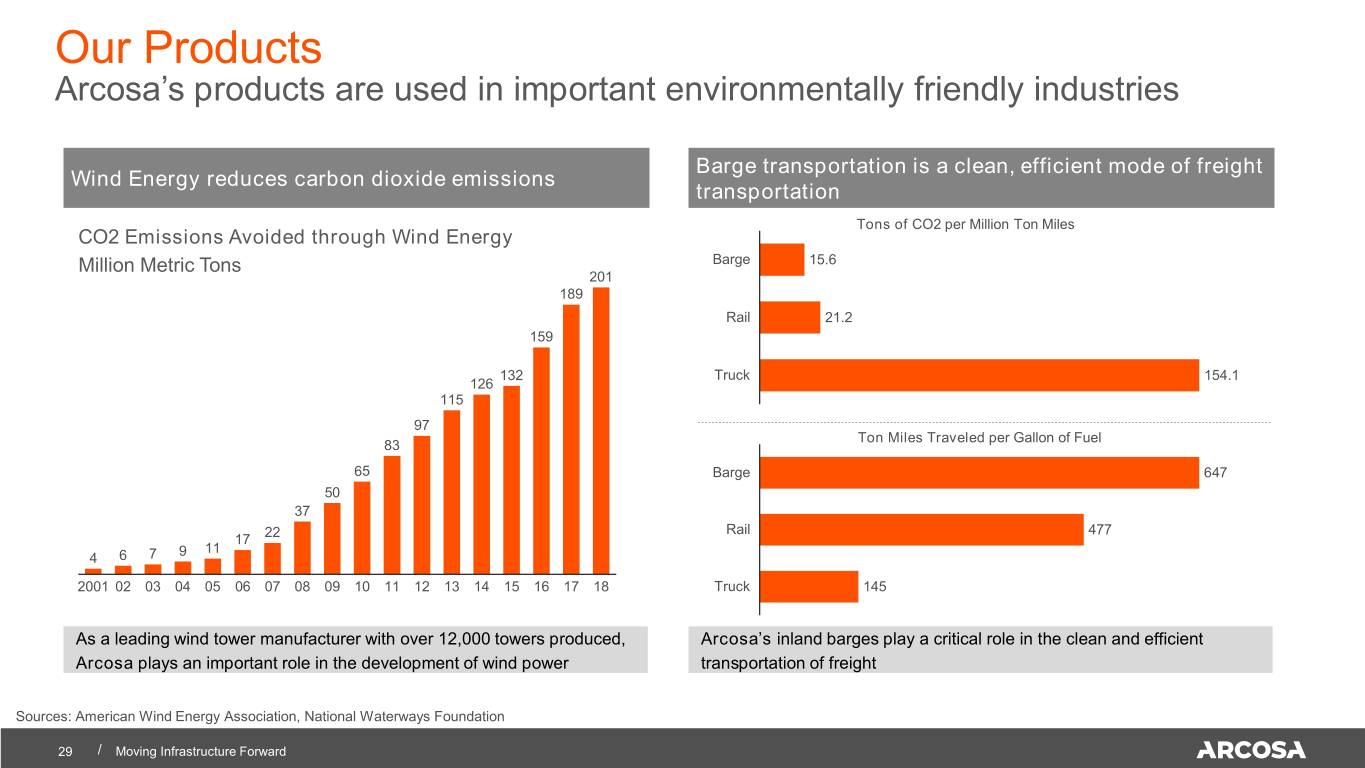
Our Products Arcosa’s products are used in important environmentally friendly industries Barge transportation is a clean, efficient mode of freight Wind Energy reduces carbon dioxide emissions transportation Tons of CO2 per Million Ton Miles CO2 Emissions Avoided through Wind Energy Million Metric Tons Barge 15.6 201 189 Rail 21.2 159 132 Truck 154.1 126 115 97 per Gallon of Fuel 83 Ton Miles Traveled 65 Barge 647 50 37 22 Rail 477 17 9 11 4 6 7 2001 02 03 04 05 06 07 08 09 10 11 12 13 14 15 16 17 18 Truck 145 As a leading wind tower manufacturer with over 12,000 towers produced, Arcosa’s inland barges play a critical role in the clean and efficient Arcosa plays an important role in the development of wind power transportation of freight Sources: American Wind Energy Association, National Waterways Foundation 29 / Moving Infrastructure Forward
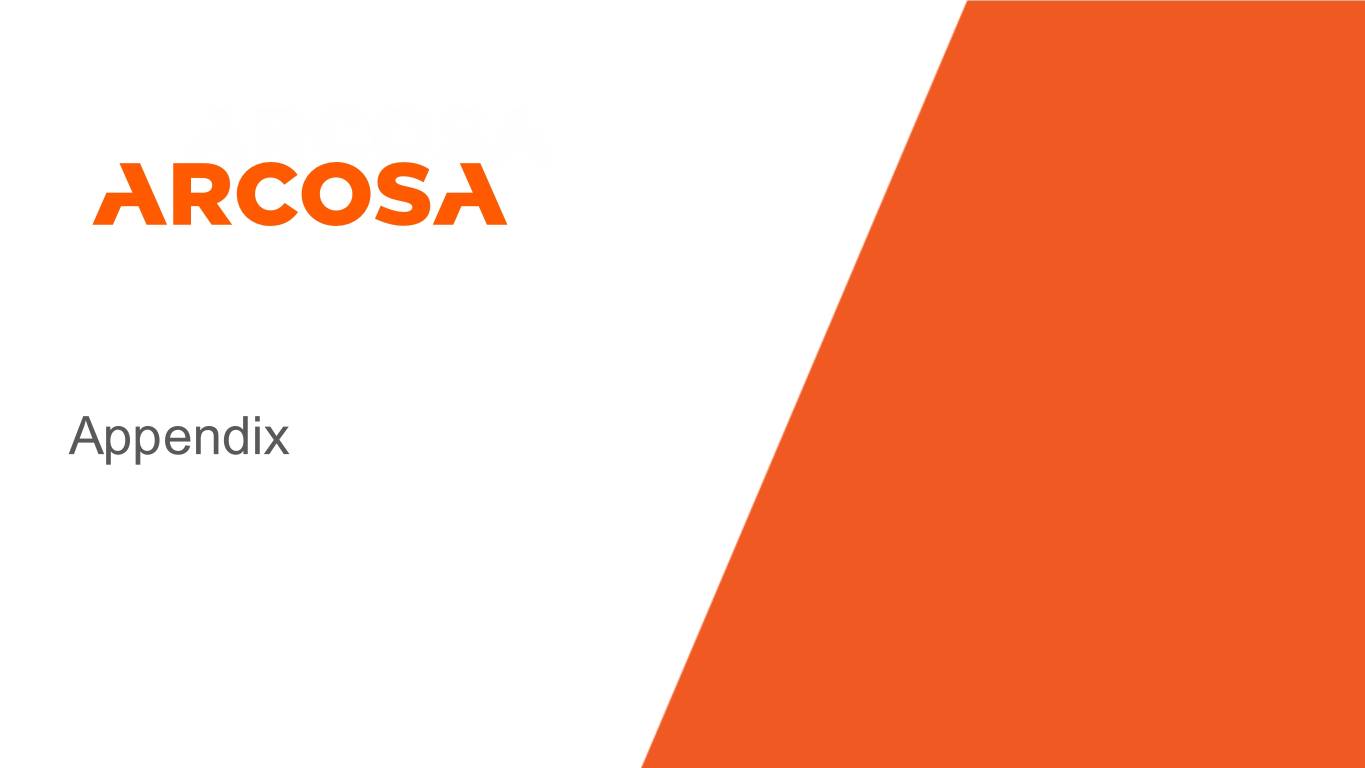
Appendix
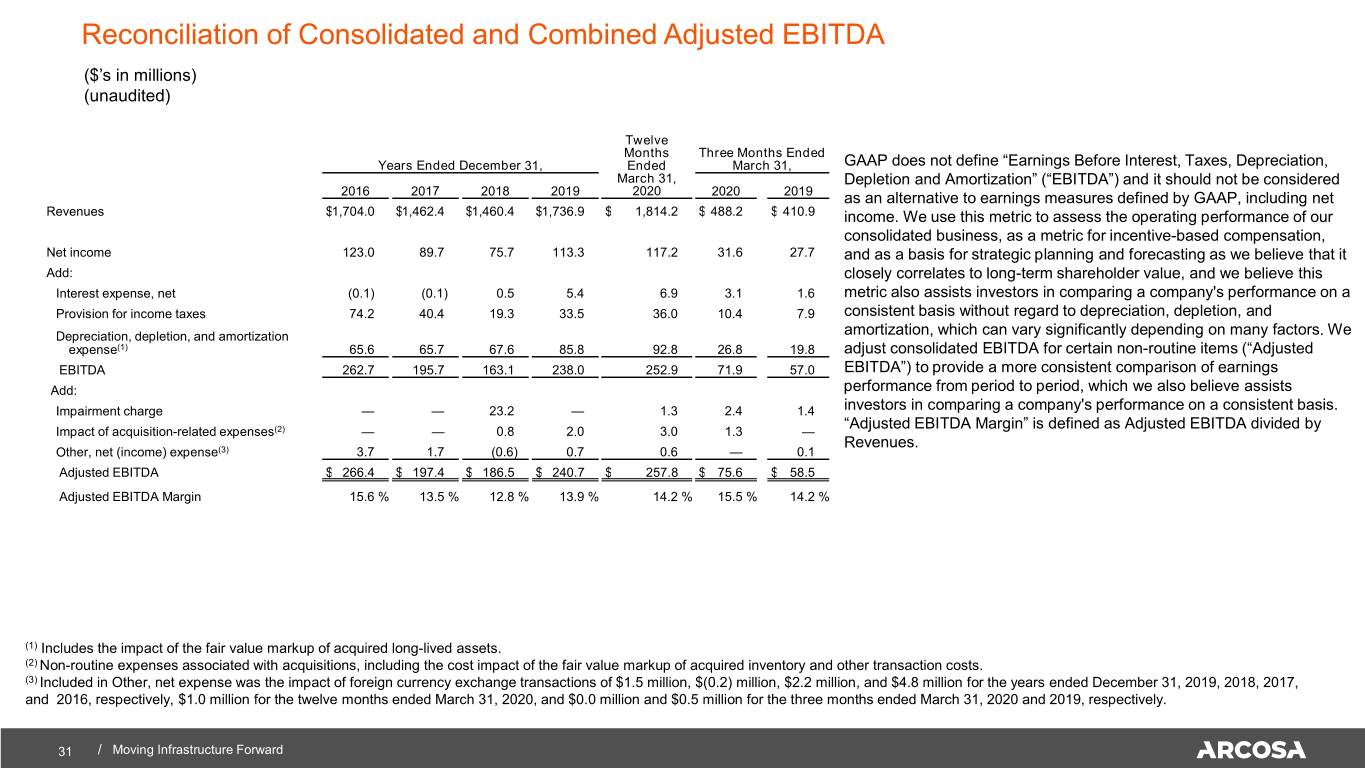
Reconciliation of Consolidated and Combined Adjusted EBITDA ($’s in millions) (unaudited) Twelve Months Three Months Ended Years Ended December 31, Ended March 31, GAAP does not define “Earnings Before Interest, Taxes, Depreciation, March 31, Depletion and Amortization” (“EBITDA”) and it should not be considered 2016 2017 2018 2019 2020 2020 2019 as an alternative to earnings measures defined by GAAP, including net Revenues $1,704.0 $1,462.4 $1,460.4 $1,736.9 $ 1,814.2 $ 488.2 $ 410.9 income. We use this metric to assess the operating performance of our consolidated business, as a metric for incentive-based compensation, Net income 123.0 89.7 75.7 113.3 117.2 31.6 27.7 and as a basis for strategic planning and forecasting as we believe that it Add: closely correlates to long-term shareholder value, and we believe this Interest expense, net (0.1) (0.1) 0.5 5.4 6.9 3.1 1.6 metric also assists investors in comparing a company's performance on a Provision for income taxes 74.2 40.4 19.3 33.5 36.0 10.4 7.9 consistent basis without regard to depreciation, depletion, and Depreciation, depletion, and amortization amortization, which can vary significantly depending on many factors. We expense(1) 65.6 65.7 67.6 85.8 92.8 26.8 19.8 adjust consolidated EBITDA for certain non-routine items (“Adjusted EBITDA 262.7 195.7 163.1 238.0 252.9 71.9 57.0 EBITDA”) to provide a more consistent comparison of earnings Add: performance from period to period, which we also believe assists Impairment charge — — 23.2 — 1.3 2.4 1.4 investors in comparing a company's performance on a consistent basis. “Adjusted EBITDA Margin” is defined as Adjusted EBITDA divided by Impact of acquisition-related expenses(2) — — 0.8 2.0 3.0 1.3 — Revenues. Other, net (income) expense(3) 3.7 1.7 (0.6) 0.7 0.6 — 0.1 Adjusted EBITDA $ 266.4 $ 197.4 $ 186.5 $ 240.7 $ 257.8 $ 75.6 $ 58.5 Adjusted EBITDA Margin 15.6 % 13.5 % 12.8 % 13.9 % 14.2 % 15.5 % 14.2 % (1) Includes the impact of the fair value markup of acquired long-lived assets. (2) Non-routine expenses associated with acquisitions, including the cost impact of the fair value markup of acquired inventory and other transaction costs. (3) Included in Other, net expense was the impact of foreign currency exchange transactions of $1.5 million, $(0.2) million, $2.2 million, and $4.8 million for the years ended December 31, 2019, 2018, 2017, and 2016, respectively, $1.0 million for the twelve months ended March 31, 2020, and $0.0 million and $0.5 million for the three months ended March 31, 2020 and 2019, respectively. 31 / Moving Infrastructure Forward
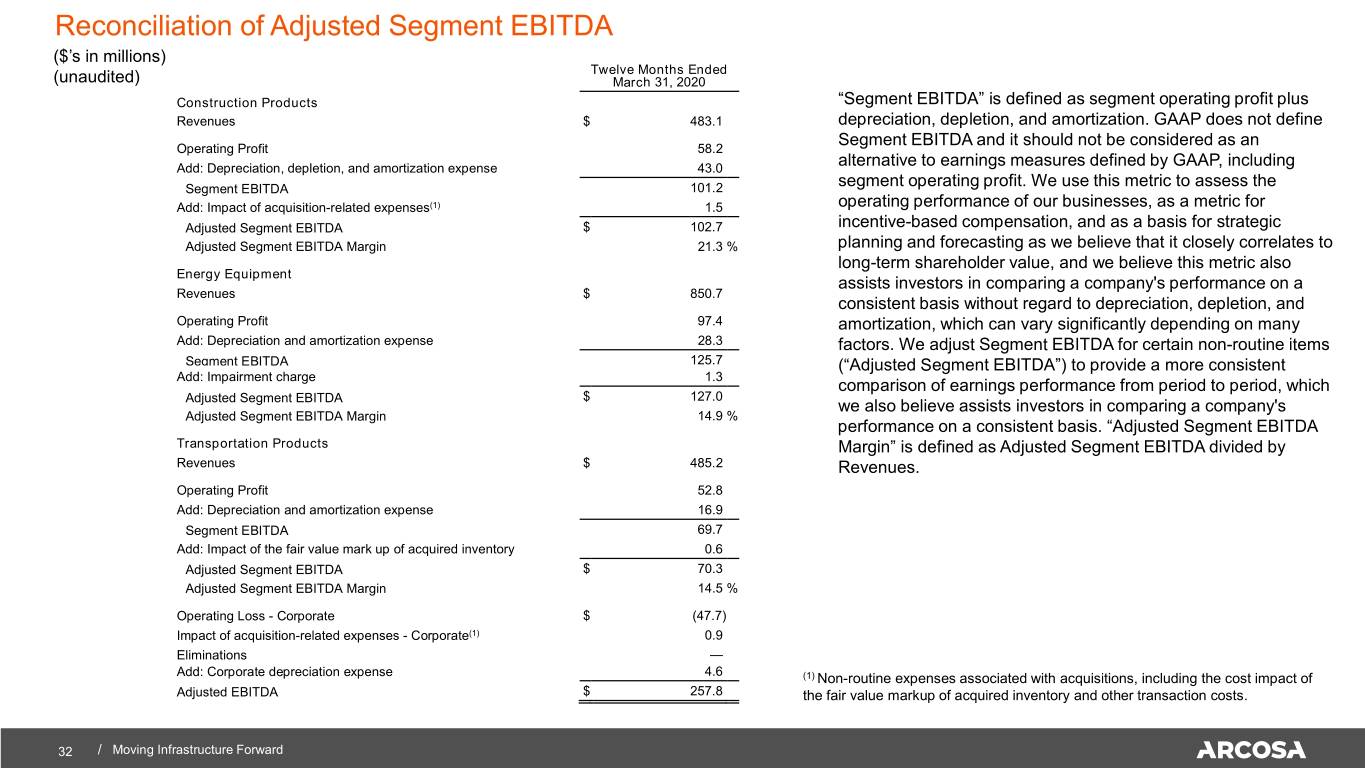
Reconciliation of Adjusted Segment EBITDA ($’s in millions) Twelve Months Ended (unaudited) March 31, 2020 Construction Products “Segment EBITDA” is defined as segment operating profit plus Revenues $ 483.1 depreciation, depletion, and amortization. GAAP does not define Segment EBITDA and it should not be considered as an Operating Profit 58.2 alternative to earnings measures defined by GAAP, including Add: Depreciation, depletion, and amortization expense 43.0 Segment EBITDA 101.2 segment operating profit. We use this metric to assess the Add: Impact of acquisition-related expenses(1) 1.5 operating performance of our businesses, as a metric for Adjusted Segment EBITDA $ 102.7 incentive-based compensation, and as a basis for strategic Adjusted Segment EBITDA Margin 21.3 % planning and forecasting as we believe that it closely correlates to long-term shareholder value, and we believe this metric also Energy Equipment assists investors in comparing a company's performance on a Revenues $ 850.7 consistent basis without regard to depreciation, depletion, and Operating Profit 97.4 amortization, which can vary significantly depending on many Add: Depreciation and amortization expense 28.3 factors. We adjust Segment EBITDA for certain non-routine items Segment EBITDA 125.7 (“Adjusted Segment EBITDA”) to provide a more consistent Add: Impairment charge 1.3 comparison of earnings performance from period to period, which Adjusted Segment EBITDA $ 127.0 we also believe assists investors in comparing a company's Adjusted Segment EBITDA Margin 14.9 % performance on a consistent basis. “Adjusted Segment EBITDA Transportation Products Margin” is defined as Adjusted Segment EBITDA divided by Revenues $ 485.2 Revenues. Operating Profit 52.8 Add: Depreciation and amortization expense 16.9 Segment EBITDA 69.7 Add: Impact of the fair value mark up of acquired inventory 0.6 Adjusted Segment EBITDA $ 70.3 Adjusted Segment EBITDA Margin 14.5 % Operating Loss - Corporate $ (47.7) Impact of acquisition-related expenses - Corporate(1) 0.9 Eliminations — Add: Corporate depreciation expense 4.6 (1) Non-routine expenses associated with acquisitions, including the cost impact of Adjusted EBITDA $ 257.8 the fair value markup of acquired inventory and other transaction costs. 32 / Moving Infrastructure Forward
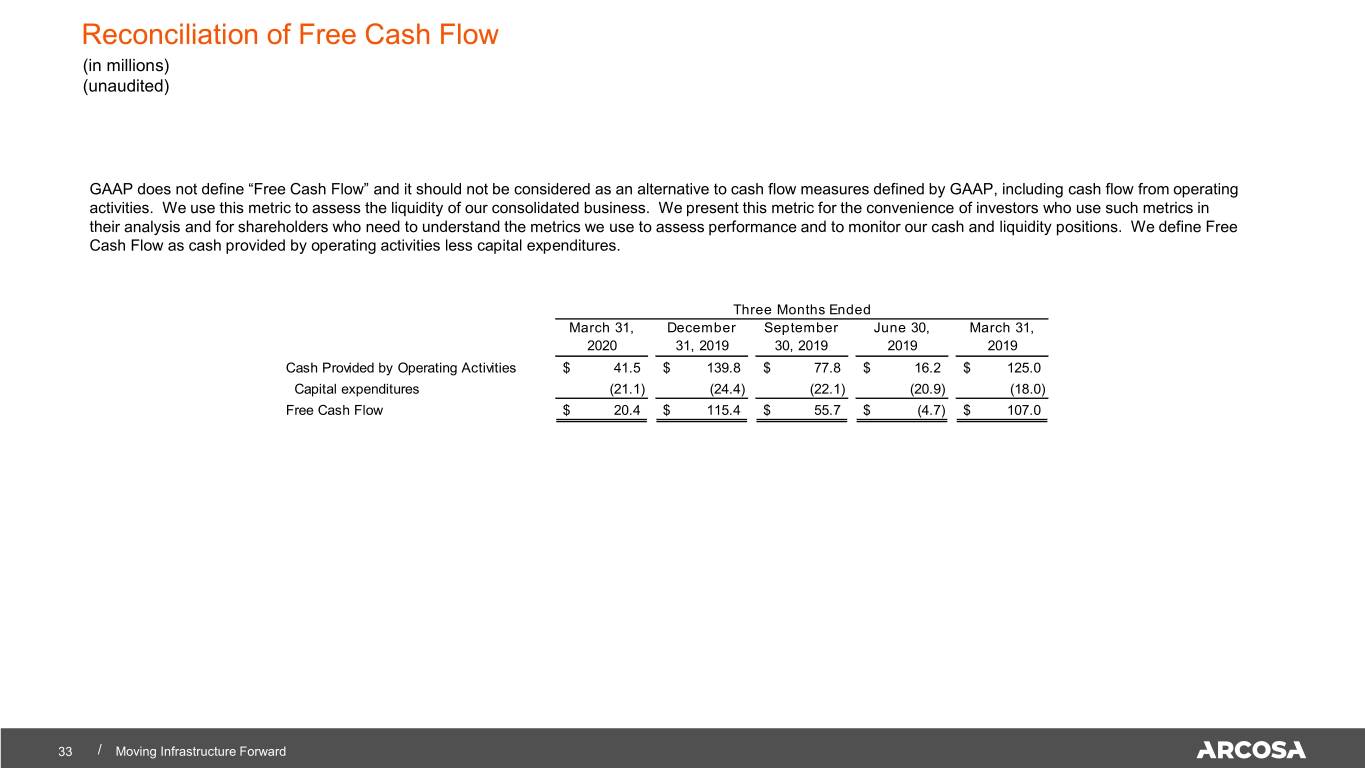
Reconciliation of Free Cash Flow (in millions) (unaudited) GAAP does not define “Free Cash Flow” and it should not be considered as an alternative to cash flow measures defined by GAAP, including cash flow from operating activities. We use this metric to assess the liquidity of our consolidated business. We present this metric for the convenience of investors who use such metrics in their analysis and for shareholders who need to understand the metrics we use to assess performance and to monitor our cash and liquidity positions. We define Free Cash Flow as cash provided by operating activities less capital expenditures. Three Months Ended March 31, December September June 30, March 31, 2020 31, 2019 30, 2019 2019 2019 Cash Provided by Operating Activities $ 41.5 $ 139.8 $ 77.8 $ 16.2 $ 125.0 Capital expenditures (21.1) (24.4) (22.1) (20.9) (18.0) Free Cash Flow $ 20.4 $ 115.4 $ 55.7 $ (4.7) $ 107.0 33 / Moving Infrastructure Forward
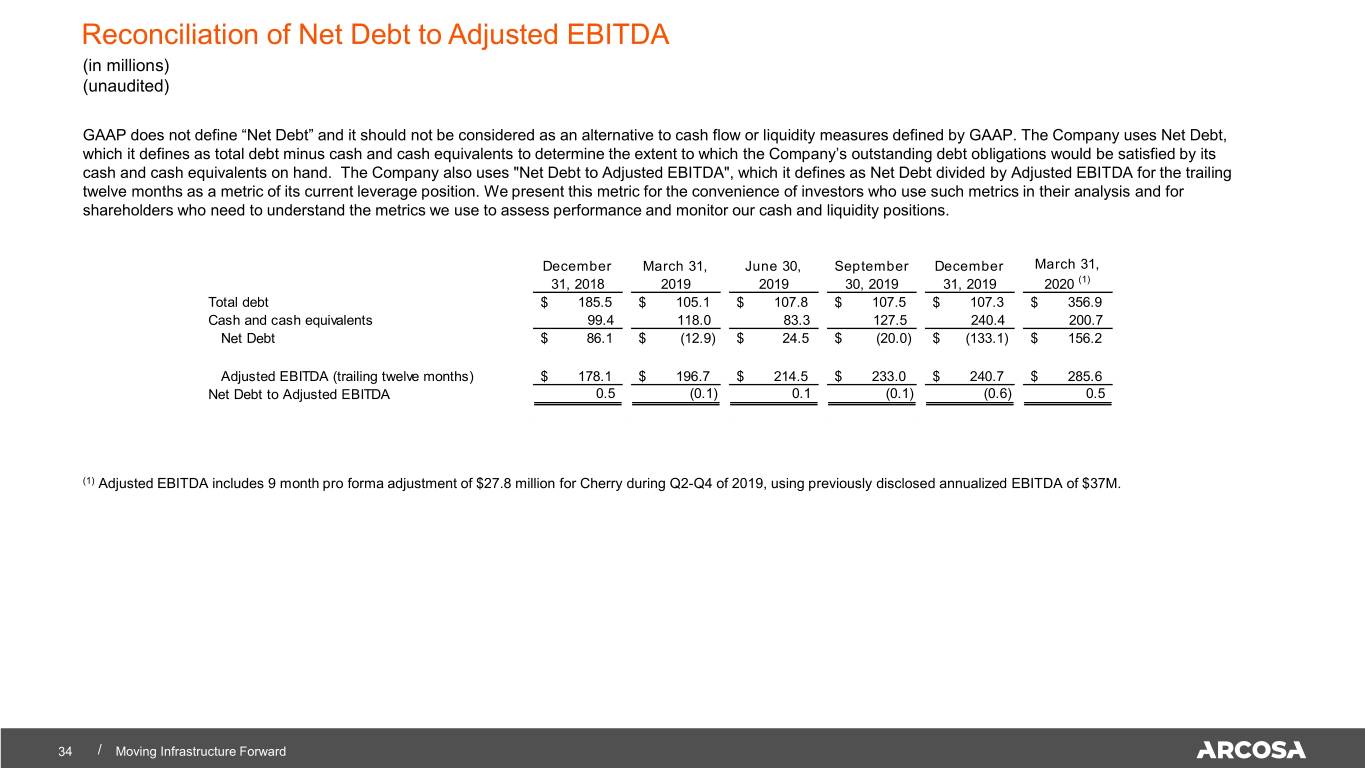
Reconciliation of Net Debt to Adjusted EBITDA (in millions) (unaudited) GAAP does not define “Net Debt” and it should not be considered as an alternative to cash flow or liquidity measures defined by GAAP. The Company uses Net Debt, which it defines as total debt minus cash and cash equivalents to determine the extent to which the Company’s outstanding debt obligations would be satisfied by its cash and cash equivalents on hand. The Company also uses "Net Debt to Adjusted EBITDA", which it defines as Net Debt divided by Adjusted EBITDA for the trailing twelve months as a metric of its current leverage position. We present this metric for the convenience of investors who use such metrics in their analysis and for shareholders who need to understand the metrics we use to assess performance and monitor our cash and liquidity positions. December March 31, June 30, September December March 31, 31, 2018 2019 2019 30, 2019 31, 2019 2020 (1) Total debt $ 185.5 $ 105.1 $ 107.8 $ 107.5 $ 107.3 $ 356.9 Cash and cash equivalents 99.4 118.0 83.3 127.5 240.4 200.7 Net Debt $ 86.1 $ (12.9) $ 24.5 $ (20.0) $ (133.1) $ 156.2 Adjusted EBITDA (trailing twelve months) $ 178.1 $ 196.7 $ 214.5 $ 233.0 $ 240.7 $ 285.6 Net Debt to Adjusted EBITDA 0.5 (0.1) 0.1 (0.1) (0.6) 0.5 (1) Adjusted EBITDA includes 9 month pro forma adjustment of $27.8 million for Cherry during Q2-Q4 of 2019, using previously disclosed annualized EBITDA of $37M. 34 / Moving Infrastructure Forward
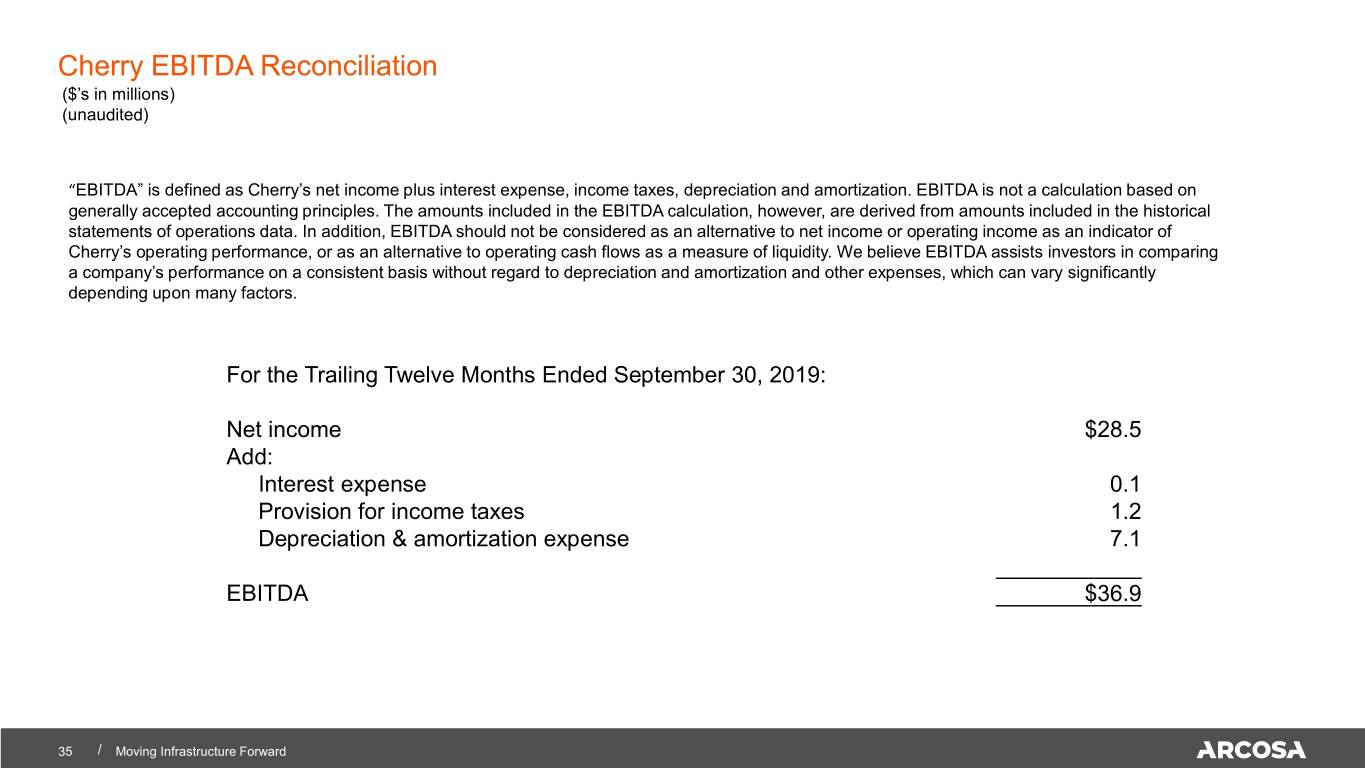
Cherry EBITDA Reconciliation ($’s in millions) (unaudited) “EBITDA” is defined as Cherry’s net income plus interest expense, income taxes, depreciation and amortization. EBITDA is not a calculation based on generally accepted accounting principles. The amounts included in the EBITDA calculation, however, are derived from amounts included in the historical statements of operations data. In addition, EBITDA should not be considered as an alternative to net income or operating income as an indicator of Cherry’s operating performance, or as an alternative to operating cash flows as a measure of liquidity. We believe EBITDA assists investors in comparing a company’s performance on a consistent basis without regard to depreciation and amortization and other expenses, which can vary significantly depending upon many factors. For the Trailing Twelve Months Ended September 30, 2019: Net income $28.5 Add: Interest expense 0.1 Provision for income taxes 1.2 Depreciation & amortization expense 7.1 EBITDA $36.9 35 / Moving Infrastructure Forward
